Maggie James's Blog, page 13
November 17, 2016
Book review - Sandrine, by Thomas H. Cook
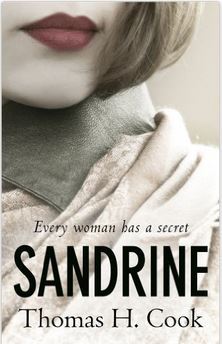 'Sandrine' by Thomas H Cook is an unusual novel, and might annoy some readers because it falls between two stools genre-wise. On the face of it, it's a legal thriller; much of the action centres around the trial of Samuel Madison for the murder of his wife Sandrine. Here's the Amazon description:
'Sandrine' by Thomas H Cook is an unusual novel, and might annoy some readers because it falls between two stools genre-wise. On the face of it, it's a legal thriller; much of the action centres around the trial of Samuel Madison for the murder of his wife Sandrine. Here's the Amazon description:How did Sandrine die?
There was no forced entry. She had been gradually stockpiling prescription drugs. A lethal quantity of Demerol was found in her blood. But did the beautiful, luminous Sandrine Madison really take her own life? The District Attorny doesn't think so. Neither does the local newspaper.
And so Sandrine's husband must now face a town convinced of his guilt and a daughter whose faith in her father has been shaken to its core. But, as he stands in the dock, Samuel Madison must confront yet more searing questions: Who was Sandrine? Why did she die? And why – how? – is she making him fall in love with her all over again?
The last line gives the clue as to the book's other focus. 'Sandrine' is one of the most moving love stories I've ever read. Not that I read much in the romance genre, as I find a lot of what's on offer is clichéd, full of lantern-jawed heroes and catwalk-beautiful heroines. If all love stories were as good as 'Sandrine', however, I'd read more widely in the genre. No cardboard stereotypes are to be found among the book's cast of characters. Instead, Samuel Madison is flawed and very believable; he's failed to achieve his ambitions and is disappointed by his marriage. Once madly in love with his wife, over time he becomes indifferent towards her, as well as apathetic about his own life. Sandrine's death forces him to acknowledge, through a tortured examination of his behaviour, how people often don't realise they possess a treasure until they lose it. The book charts Sam's gradual realisation of his faults and asks whether love can be reawakened, even after death. And poses the question: did he murder Sandrine?
This isn’t an 'edge of the seat' type of legal thriller; the pace is slower than anything John Grisham might write. The novel has its issues; some readers report being turned off by its frequent literary references, which are frequent and colourful. Given both Sandrine and Sam work at a liberal arts college, and Sam's ambition is to be a writer, it seems reasonable they'd make such references, so they didn't bother me. The main weakness, for me, was that some aspects of the story stretch belief, but I can't elaborate without giving major plot spoilers! Overall, though, this novel was a joy to read, and the ending moved me to tears. I highly recommend it.
What about you? Have you read 'Sandrine' and, if so, what did you think? Leave a comment and let me know!
UK readers, click here to go to 'Sandrine' on Amazon...
Enjoyed this post? Please share via the links below:
Why not subscribe to my blog?
If you've enjoyed this post, how about subscribing to my blog via RSS feed or email? Either click the links in my blog sidebar or sign up via Networked Blogs, also in the sidebar. It'll be great to have you on board!Free books when you sign up for my newsletter!
 Sign up for my newsletter and you'll receive books from other novelists (with their permission, of course!), reading recommendations, discounts on my future releases, as well as promotions and giveaways. I'll contact you every two months or when I release a new title, and will never divulge your details to any third parties. To sign up, click this link. Thank you!
Sign up for my newsletter and you'll receive books from other novelists (with their permission, of course!), reading recommendations, discounts on my future releases, as well as promotions and giveaways. I'll contact you every two months or when I release a new title, and will never divulge your details to any third parties. To sign up, click this link. Thank you!
Published on November 17, 2016 07:38
November 16, 2016
The wonderful world of synaesthesia
By Maggie James
People who see music and taste words...
 Recently I discovered I have synaesthesia, which came as a surprise! It seems that many people, myself included, don't realise that they view the world differently. What is synaesthesia, you may be wondering? It’s when the senses cross over, meaning one type of stimulation evokes the sensation of another. For example, hearing a sound may result in a synaesthete seeing that sound in colour; musicians such as Billy Joel and Mary J. Blige visualise music this way. Synaethesthia can combine any of the senses, although the most common types are the ones I have, when letters, numbers and time assume colours and shapes. I find some of the rarer forms, such as lexical-gustatory synaesthesia, in which people taste words, fascinating! As a foodie, I’m quite envious of that one, but studies show only 0.2% of people have lexical-gustatory synaesthesia.
Recently I discovered I have synaesthesia, which came as a surprise! It seems that many people, myself included, don't realise that they view the world differently. What is synaesthesia, you may be wondering? It’s when the senses cross over, meaning one type of stimulation evokes the sensation of another. For example, hearing a sound may result in a synaesthete seeing that sound in colour; musicians such as Billy Joel and Mary J. Blige visualise music this way. Synaethesthia can combine any of the senses, although the most common types are the ones I have, when letters, numbers and time assume colours and shapes. I find some of the rarer forms, such as lexical-gustatory synaesthesia, in which people taste words, fascinating! As a foodie, I’m quite envious of that one, but studies show only 0.2% of people have lexical-gustatory synaesthesia.
To help non-synaesthetes understand, to some extent we all do this anyway. Have you ever talked about warm colours or complained that the weather is bitterly cold? Then you’ll have some idea of what I mean. Think about smell and taste; those senses are linked for almost everyone, meaning we can predict how a food will taste from sniffing it. Synaesthesia takes this process a step further. It’s a shame some of the articles I read referred to it as an affliction or medical condition. To me, that smacks of the prejudice that existed decades ago against left-handed people, and isn’t helpful.
August is such an orange month...
 There are two main forms of synaesthesia – projective and associative. People with the former type actually see the shapes and colours projected into their vision, whereas others, like me, have the associative type – we see the results in our mind’s eye, not in reality.
There are two main forms of synaesthesia – projective and associative. People with the former type actually see the shapes and colours projected into their vision, whereas others, like me, have the associative type – we see the results in our mind’s eye, not in reality.
Statistics vary as to how many people are synaesthetes – the most common one indicates that 4.4% of people have it. Some researchers have postulated that everyone is born with synaesthesia, with most people losing the ability early in childhood. Early research linked synaethesia to being left-handed and poor with mathematics, although later studies contradict such findings. As a right-handed ex-accountant, that's definitely not true for me!
I came across the condition a while ago, thought "yeah, I have that - doesn't everyone see letters in colour?" and then didn't think any more about it. After all, we don’t tend to ask people what colour their alphabet is, or how they visualise time; I honestly thought everyone must use some sort of mental map to process numbers and years. It was only when I read something about Vladimir Nabokov, who was a synaesthete, that I chanced on a Wikipedia article on the subject. After reading through it, it was obvious to me that I had synaesthesia and that it took several forms, which apparently is common. I took the long and very detailed online test at http://www.synesthete.org/ and the results confirmed my suspicions. I’ve already volunteered to be part of a research project into the subject, which should prove fun!
Tasting of Flora and the country green....
 Kandinsky may have been a synaesthete!It appears that synaesthesia may be more prevalent in women than men, and is seven times more likely to occur in artists, musicians and writers. Besides Nabokov, other authors with synaesthesia include Joanne Harris and Orhan Pamuk.
Kandinsky may have been a synaesthete!It appears that synaesthesia may be more prevalent in women than men, and is seven times more likely to occur in artists, musicians and writers. Besides Nabokov, other authors with synaesthesia include Joanne Harris and Orhan Pamuk.
In literature, synaesthesia refers to a technique adopted by writers to present fiction so it appeals to more than one sense at a time. Take this quote from Keats’s Ode to a Nightingale:
Tasting of Flora and the country green,
Dance, and Provencal song, and sun burnt mirth!
In this example, music, dance, etc, are described as having taste – very synaesthetic! What about this quote from Julia Glass’s novel The Whole World Over?
The word would fill her mind for a few minutes with a single color: not an unpleasant sensation but still an intrusion… Patriarch: Brown, she thought, a temple of a word, a shiny red brown, like the surface of a chestnut.
I have to disagree – ‘patriarch’ is definitely lemon-coloured! No two synaesthetes view things in quite the same way, it seems. For me, words take on the colour of their first letter, unless we're talking about weekdays or months, and 'P' is pale yellow.
I’m considering ways to use my synaesthesia in my writing, both through my narrative description and as the basis for a novel or series of novels. Now that I’ve discovered I’m a synaesthete, I’m keen to put it to practical use!
What about you? Are any of you synaesthetes and if so, what types do you have? Leave a comment and let me know!
His Kidnapper's Shoes has now been Republished!
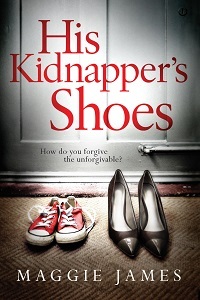 Click the image to buy your copy!In other news, I'm delighted to report that the new version of His Kidnapper's Shoes has now been republished by Lake Union in both kindle and paperback formats - here's the link. A very proud moment for me!
Click the image to buy your copy!In other news, I'm delighted to report that the new version of His Kidnapper's Shoes has now been republished by Lake Union in both kindle and paperback formats - here's the link. A very proud moment for me!
I had great fun on launch day by holding an online Facebook party to celebrate. The festivities included lots of competitions, the prizes being all things fiction-related, including signed copies of novels by other authors. The great thing about an online party is that there's no chance of a hangover, and you can eat as much virtual food as you like without worrying about calories!
My next novel, After She's Gone, will be published by Lake Union on March 16, 2017, and will shortly be available for pre-order. When that happens, I'll let you know!
Enjoyed this post? Please share via the links below:
Why not sign up for my blog?
If you've enjoyed this post, how about subscribing to my blog via RSS feed or email? Either click the links in my blog sidebar or sign up via Networked Blogs, also in the sidebar. It'll be great to have you on board!
Free books when you sign up for my newsletter!
 Sign up for my newsletter and you'll receive books from other novelists (with their permission, of course!), reading recommendations, discounts on my future releases, as well as promotions and giveaways. I'll contact you every two months or when I release a new title, and will never divulge your details to any third parties. To sign up, click this link. Thank you!
Sign up for my newsletter and you'll receive books from other novelists (with their permission, of course!), reading recommendations, discounts on my future releases, as well as promotions and giveaways. I'll contact you every two months or when I release a new title, and will never divulge your details to any third parties. To sign up, click this link. Thank you!
People who see music and taste words...
 Recently I discovered I have synaesthesia, which came as a surprise! It seems that many people, myself included, don't realise that they view the world differently. What is synaesthesia, you may be wondering? It’s when the senses cross over, meaning one type of stimulation evokes the sensation of another. For example, hearing a sound may result in a synaesthete seeing that sound in colour; musicians such as Billy Joel and Mary J. Blige visualise music this way. Synaethesthia can combine any of the senses, although the most common types are the ones I have, when letters, numbers and time assume colours and shapes. I find some of the rarer forms, such as lexical-gustatory synaesthesia, in which people taste words, fascinating! As a foodie, I’m quite envious of that one, but studies show only 0.2% of people have lexical-gustatory synaesthesia.
Recently I discovered I have synaesthesia, which came as a surprise! It seems that many people, myself included, don't realise that they view the world differently. What is synaesthesia, you may be wondering? It’s when the senses cross over, meaning one type of stimulation evokes the sensation of another. For example, hearing a sound may result in a synaesthete seeing that sound in colour; musicians such as Billy Joel and Mary J. Blige visualise music this way. Synaethesthia can combine any of the senses, although the most common types are the ones I have, when letters, numbers and time assume colours and shapes. I find some of the rarer forms, such as lexical-gustatory synaesthesia, in which people taste words, fascinating! As a foodie, I’m quite envious of that one, but studies show only 0.2% of people have lexical-gustatory synaesthesia.To help non-synaesthetes understand, to some extent we all do this anyway. Have you ever talked about warm colours or complained that the weather is bitterly cold? Then you’ll have some idea of what I mean. Think about smell and taste; those senses are linked for almost everyone, meaning we can predict how a food will taste from sniffing it. Synaesthesia takes this process a step further. It’s a shame some of the articles I read referred to it as an affliction or medical condition. To me, that smacks of the prejudice that existed decades ago against left-handed people, and isn’t helpful.
August is such an orange month...
 There are two main forms of synaesthesia – projective and associative. People with the former type actually see the shapes and colours projected into their vision, whereas others, like me, have the associative type – we see the results in our mind’s eye, not in reality.
There are two main forms of synaesthesia – projective and associative. People with the former type actually see the shapes and colours projected into their vision, whereas others, like me, have the associative type – we see the results in our mind’s eye, not in reality.Statistics vary as to how many people are synaesthetes – the most common one indicates that 4.4% of people have it. Some researchers have postulated that everyone is born with synaesthesia, with most people losing the ability early in childhood. Early research linked synaethesia to being left-handed and poor with mathematics, although later studies contradict such findings. As a right-handed ex-accountant, that's definitely not true for me!
I came across the condition a while ago, thought "yeah, I have that - doesn't everyone see letters in colour?" and then didn't think any more about it. After all, we don’t tend to ask people what colour their alphabet is, or how they visualise time; I honestly thought everyone must use some sort of mental map to process numbers and years. It was only when I read something about Vladimir Nabokov, who was a synaesthete, that I chanced on a Wikipedia article on the subject. After reading through it, it was obvious to me that I had synaesthesia and that it took several forms, which apparently is common. I took the long and very detailed online test at http://www.synesthete.org/ and the results confirmed my suspicions. I’ve already volunteered to be part of a research project into the subject, which should prove fun!
Tasting of Flora and the country green....
 Kandinsky may have been a synaesthete!It appears that synaesthesia may be more prevalent in women than men, and is seven times more likely to occur in artists, musicians and writers. Besides Nabokov, other authors with synaesthesia include Joanne Harris and Orhan Pamuk.
Kandinsky may have been a synaesthete!It appears that synaesthesia may be more prevalent in women than men, and is seven times more likely to occur in artists, musicians and writers. Besides Nabokov, other authors with synaesthesia include Joanne Harris and Orhan Pamuk.In literature, synaesthesia refers to a technique adopted by writers to present fiction so it appeals to more than one sense at a time. Take this quote from Keats’s Ode to a Nightingale:
Tasting of Flora and the country green,
Dance, and Provencal song, and sun burnt mirth!
In this example, music, dance, etc, are described as having taste – very synaesthetic! What about this quote from Julia Glass’s novel The Whole World Over?
The word would fill her mind for a few minutes with a single color: not an unpleasant sensation but still an intrusion… Patriarch: Brown, she thought, a temple of a word, a shiny red brown, like the surface of a chestnut.
I have to disagree – ‘patriarch’ is definitely lemon-coloured! No two synaesthetes view things in quite the same way, it seems. For me, words take on the colour of their first letter, unless we're talking about weekdays or months, and 'P' is pale yellow.
I’m considering ways to use my synaesthesia in my writing, both through my narrative description and as the basis for a novel or series of novels. Now that I’ve discovered I’m a synaesthete, I’m keen to put it to practical use!
What about you? Are any of you synaesthetes and if so, what types do you have? Leave a comment and let me know!
His Kidnapper's Shoes has now been Republished!
 Click the image to buy your copy!In other news, I'm delighted to report that the new version of His Kidnapper's Shoes has now been republished by Lake Union in both kindle and paperback formats - here's the link. A very proud moment for me!
Click the image to buy your copy!In other news, I'm delighted to report that the new version of His Kidnapper's Shoes has now been republished by Lake Union in both kindle and paperback formats - here's the link. A very proud moment for me!I had great fun on launch day by holding an online Facebook party to celebrate. The festivities included lots of competitions, the prizes being all things fiction-related, including signed copies of novels by other authors. The great thing about an online party is that there's no chance of a hangover, and you can eat as much virtual food as you like without worrying about calories!
My next novel, After She's Gone, will be published by Lake Union on March 16, 2017, and will shortly be available for pre-order. When that happens, I'll let you know!
Enjoyed this post? Please share via the links below:
Why not sign up for my blog?
If you've enjoyed this post, how about subscribing to my blog via RSS feed or email? Either click the links in my blog sidebar or sign up via Networked Blogs, also in the sidebar. It'll be great to have you on board!
Free books when you sign up for my newsletter!
 Sign up for my newsletter and you'll receive books from other novelists (with their permission, of course!), reading recommendations, discounts on my future releases, as well as promotions and giveaways. I'll contact you every two months or when I release a new title, and will never divulge your details to any third parties. To sign up, click this link. Thank you!
Sign up for my newsletter and you'll receive books from other novelists (with their permission, of course!), reading recommendations, discounts on my future releases, as well as promotions and giveaways. I'll contact you every two months or when I release a new title, and will never divulge your details to any third parties. To sign up, click this link. Thank you!
Published on November 16, 2016 16:00
November 10, 2016
His Kidnapper's Shoes is almost here!
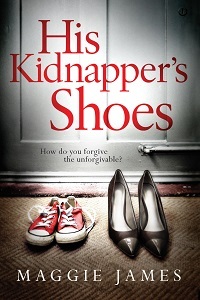 Click the link to buy!This is an exciting time for me as an author! In less than a week, Lake Union will republish His Kidnapper's Shoes in e-book and paperback formats. I wrote the first draft between December 2010 and February 2011, then published it in March 2013. The new version has gone through Lake Union's editorial process, emerging leaner and fitter! Launch day is Tuesday, November 15, 2016, and it will be a very proud moment for me. His Kidnapper's Shoes is available now for pre-order at Amazon via this link.
Click the link to buy!This is an exciting time for me as an author! In less than a week, Lake Union will republish His Kidnapper's Shoes in e-book and paperback formats. I wrote the first draft between December 2010 and February 2011, then published it in March 2013. The new version has gone through Lake Union's editorial process, emerging leaner and fitter! Launch day is Tuesday, November 15, 2016, and it will be a very proud moment for me. His Kidnapper's Shoes is available now for pre-order at Amazon via this link.US readers can enter a Goodreads giveaway to win one of a hundred e-book copies. Sorry, readers from other parts of the world, I'd love to open the competition to you but Lake Union make the rules, not me. You can enter via this link.
In other news, I've set up an online launch party on Facebook. It's taking place on Tuesday, November 15, 2016, between 7 and 9pm UK time. If you're on Facebook and would like to join in the fun, send me your email address and I'll invite you. There will be virtual food, music, dancing and champagne, along with great competitions and guest star appearances! Prizes on offer include signed paperbacks from myself and other authors along with yummy Booja Booja truffles. If you're an author yourself and you're curious how online launch parties work, why not come along?
I've also created a Thunderclap campaign to help launch His Kidnapper's Shoes. For those of you who don't know what a Thunderclap is, it's a way of boosting awareness via social media. Thunderclap operates like an online flash mob, spreading an idea through Facebook, Twitter, and Tumblr. You can support mine via this link, for any and all of the accounts you have with those three entities.
Lastly, I had great fun creating a short trailer for launching His Kidnapper's Shoes! I love tinkering around with projects like this one and it was quick and easy to do. You can view the result on YouTube via this link.
Enjoyed this post? Please share via the links below:
Why not subscribe to my blog?
If you've enjoyed this post, how about subscribing to my blog via RSS feed or email? Either click the links in my blog sidebar or sign up via Networked Blogs, also in the sidebar. It'll be great to have you on board!
Get your free copy of The Second Captive!
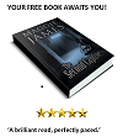 Sign up for my newsletter and you'll receive a free copy of The Second Captive in either Kindle, epub or PDF format! What will you get from my emails? Books from other novelists (with their permission, of course!), reading recommendations, discounts on my future releases, as well as promotions and giveaways. I'll contact you every two months or when I release a new title, and will never divulge your details to any third parties. To sign up, click this link. Thank you!
Sign up for my newsletter and you'll receive a free copy of The Second Captive in either Kindle, epub or PDF format! What will you get from my emails? Books from other novelists (with their permission, of course!), reading recommendations, discounts on my future releases, as well as promotions and giveaways. I'll contact you every two months or when I release a new title, and will never divulge your details to any third parties. To sign up, click this link. Thank you!
Published on November 10, 2016 02:25
October 12, 2016
Audio interview with Joanna Penn
By Maggie James
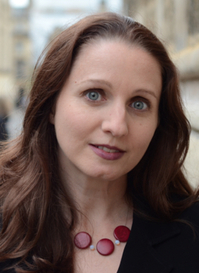 Today I'm delighted to welcome to my blog the New York Times and USA today best-selling novelist Joanna Penn. Joanna is the author of the ARKANE adventure series and also a trilogy of crime thrillers. She has also written several non-fiction books aimed at other writers. Her latest is The Successful Author Mindset, containing a wealth of information to help would-be scribes. I highly recommend it.
Today I'm delighted to welcome to my blog the New York Times and USA today best-selling novelist Joanna Penn. Joanna is the author of the ARKANE adventure series and also a trilogy of crime thrillers. She has also written several non-fiction books aimed at other writers. Her latest is The Successful Author Mindset, containing a wealth of information to help would-be scribes. I highly recommend it.
I had the pleasure on interviewing Joanna once before (click here to read the post), so it was good to catch up with her again! In a variation to my usual style of interview, I spoke with Joanna on Skype and recorded our conversation, which mainly centred around The Succesful Author Mindset and the importance of writers maintaining a positive attitude.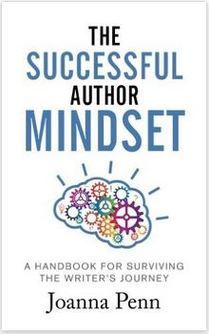 In her book, Joanna is open about her own journey towards positivity, quoting from the writing journals she has kept on her road to success. The book and our interview examine thorny topics such as fear of failure and criticism, perfectionism and procrastination, and dealing with other people's attitudes. In her book, Joanna stresses the importance of knowing yourself, of developing professional habits and relationships, as well as continuing to learn the craft of writing.
In her book, Joanna is open about her own journey towards positivity, quoting from the writing journals she has kept on her road to success. The book and our interview examine thorny topics such as fear of failure and criticism, perfectionism and procrastination, and dealing with other people's attitudes. In her book, Joanna stresses the importance of knowing yourself, of developing professional habits and relationships, as well as continuing to learn the craft of writing.
To listen to the interview (31 minutes in length), click here. Apologies for the less than wonderful sound quality - the interview didn't record as well as I'd hoped.
To find out more about Joanna and her books, visit her fiction website at www.jfpenn.com or visit her website for authors at www.thecreativepenn.com.
Enjoyed this post? Please share via the links below:
Why not subscribe to my blog?
If you've enjoyed this post, how about subscribing to my blog via RSS feed or email? Either click the links in my blog sidebar or sign up via Networked Blogs, also in the sidebar. It'll be great to have you on board!
Get your free copy of The Second Captive!
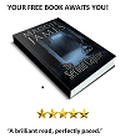 Sign up for my newsletter and you'll receive a free copy of The Second Captive in either Kindle, epub or PDF format! What will you get from my emails? Books from other novelists (with their permission, of course!), reading recommendations, discounts on my future releases, as well as promotions and giveaways. I'll contact you every two months or when I release a new title, and will never divulge your details to any third parties. To sign up, click this link. Thank you!
Sign up for my newsletter and you'll receive a free copy of The Second Captive in either Kindle, epub or PDF format! What will you get from my emails? Books from other novelists (with their permission, of course!), reading recommendations, discounts on my future releases, as well as promotions and giveaways. I'll contact you every two months or when I release a new title, and will never divulge your details to any third parties. To sign up, click this link. Thank you!
 Today I'm delighted to welcome to my blog the New York Times and USA today best-selling novelist Joanna Penn. Joanna is the author of the ARKANE adventure series and also a trilogy of crime thrillers. She has also written several non-fiction books aimed at other writers. Her latest is The Successful Author Mindset, containing a wealth of information to help would-be scribes. I highly recommend it.
Today I'm delighted to welcome to my blog the New York Times and USA today best-selling novelist Joanna Penn. Joanna is the author of the ARKANE adventure series and also a trilogy of crime thrillers. She has also written several non-fiction books aimed at other writers. Her latest is The Successful Author Mindset, containing a wealth of information to help would-be scribes. I highly recommend it.I had the pleasure on interviewing Joanna once before (click here to read the post), so it was good to catch up with her again! In a variation to my usual style of interview, I spoke with Joanna on Skype and recorded our conversation, which mainly centred around The Succesful Author Mindset and the importance of writers maintaining a positive attitude.
 In her book, Joanna is open about her own journey towards positivity, quoting from the writing journals she has kept on her road to success. The book and our interview examine thorny topics such as fear of failure and criticism, perfectionism and procrastination, and dealing with other people's attitudes. In her book, Joanna stresses the importance of knowing yourself, of developing professional habits and relationships, as well as continuing to learn the craft of writing.
In her book, Joanna is open about her own journey towards positivity, quoting from the writing journals she has kept on her road to success. The book and our interview examine thorny topics such as fear of failure and criticism, perfectionism and procrastination, and dealing with other people's attitudes. In her book, Joanna stresses the importance of knowing yourself, of developing professional habits and relationships, as well as continuing to learn the craft of writing.To listen to the interview (31 minutes in length), click here. Apologies for the less than wonderful sound quality - the interview didn't record as well as I'd hoped.
To find out more about Joanna and her books, visit her fiction website at www.jfpenn.com or visit her website for authors at www.thecreativepenn.com.
Enjoyed this post? Please share via the links below:
Why not subscribe to my blog?
If you've enjoyed this post, how about subscribing to my blog via RSS feed or email? Either click the links in my blog sidebar or sign up via Networked Blogs, also in the sidebar. It'll be great to have you on board!
Get your free copy of The Second Captive!
 Sign up for my newsletter and you'll receive a free copy of The Second Captive in either Kindle, epub or PDF format! What will you get from my emails? Books from other novelists (with their permission, of course!), reading recommendations, discounts on my future releases, as well as promotions and giveaways. I'll contact you every two months or when I release a new title, and will never divulge your details to any third parties. To sign up, click this link. Thank you!
Sign up for my newsletter and you'll receive a free copy of The Second Captive in either Kindle, epub or PDF format! What will you get from my emails? Books from other novelists (with their permission, of course!), reading recommendations, discounts on my future releases, as well as promotions and giveaways. I'll contact you every two months or when I release a new title, and will never divulge your details to any third parties. To sign up, click this link. Thank you!
Published on October 12, 2016 07:44
October 11, 2016
Author Interview - Peter James
By Maggie James
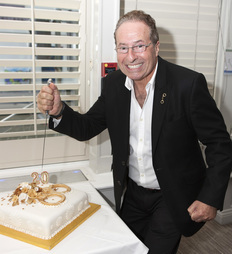 I'm delighted to welcome novelist Peter James to my blog today! Peter is the author of the best-selling crime thrillers featuring Brighton-based Detective Superintendent Roy Grace, which have sold 18 million copies worldwide. Peter also writes supernatural fiction, such as The House on Cold Hill, a book I enjoyed very much. Welcome to my blog, Peter! With no further ado, let's proceed with the interview.
I'm delighted to welcome novelist Peter James to my blog today! Peter is the author of the best-selling crime thrillers featuring Brighton-based Detective Superintendent Roy Grace, which have sold 18 million copies worldwide. Peter also writes supernatural fiction, such as The House on Cold Hill, a book I enjoyed very much. Welcome to my blog, Peter! With no further ado, let's proceed with the interview.
To what extent does DS Roy Grace reflect aspects of your own personality?
Roy Grace is based very loosely on former Chief Superintendent David Gaylor of Sussex CID. I was lucky enough to shadow David for many weeks over several years, during which he rose from Detective Inspector to Detective Superintendent. His office is Roy Grace’s office, and one of his areas of specialization was cold cases – also shared by Grace. But there the similarity ends – David is happily married and has no particular interest in the occult – although he is very open minded.
I like Roy Grace the most of any character I have created, and there is a lot of myself in him. I’m in some ways quite a loner, too. I have a fascination for the paranormal. I share his views when he attacks bigots, when he attacks horrible architecture, or when, in ‘Not Dead Enough’, he launches into a tirade at the terrible state of our hospital in Brighton, the Sussex County. Roy Grace is a man who believes that we all have an obligation, with our lives, to try to leave the world a slightly better place than when we first came into it. That’s my view and it is partly why I write, to examine and try to understand better the world we live in and why people do the things they go. But I do also love the terrible Norman Potting. He is able to say all kinds of politically incorrect things that can no longer be said!
Out of all your antagonists, who’s been the most fun for you to create, and why?
Jodie in ‘Love You Dead’, and Dr Crisp in ‘You Are Dead’. Jodie is inspired by a woman I met in a prison, who murdered her husband and mother-in-law, she is so evil she makes you smile at her audacity. Similarly, I like Doctor Edward Crisp’s combination of charm, quirkiness and utter evil – modelled on someone I know who is in a different profession.
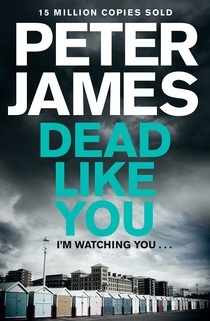 What’s been your most challenging novel when it comes to plotting, and why?
What’s been your most challenging novel when it comes to plotting, and why?
‘Dead Like You’ because it took place in two different time periods which was very complicated.
How does your writing day shape up? Lark or Owl? Plotter or Pantser?
My whole writing day is back to front… It is from the time when I was writing novels whilst working full time in film and television as a screen writer and producer, so I had to make my “Me time” to write. My writing day starts at 6pm in the evening, when I mix a large vodka martini, with four olives, put on some music, light up a cigar and get into a zone. I try to ensure that whatever I’m doing I leave myself time to write 1000 words 6 days a week. In terms of research – a lot I do before, but then as I progress I realise there is more I need to learn, and I’m an absolute stickler for research.
In the past, you’ve been very involved in film production. Do you see yourself returning to working in the film industry in the future?
I was a film producer for many years but I realized in 2005, shortly after making the film I'm most proud of, Merchant Of Venice with Al Pacino and Jeremy Irons, that actually, I much prefer writing novels. The problem with films is that they are such a collaborative process; it becomes almost like a committee, but up to 20 people who each believe it is their film! For example you have the screenwriter, and very often a second screen writer or “polisher”, the producer – sometimes two or even more. The executive producers, again sometimes two or more, the director, the principal actors, the director of photography, the set designer, the editor, the composer, the distributor and so on. Each and every one of these has influence on the end product. And most normally have egos the size of aircraft carriers. With a book the creative process is utterly pure. There is just myself and my agent and my editor. If I don’t want to change one single word I have written I don’t have to. I love that freedom from the “committee” process of film-making. I’d be very happy never to be involved in that industry again!
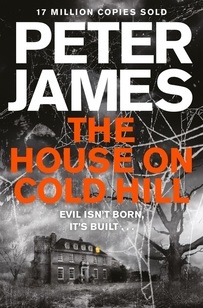 Have you always been interested in the paranormal, or does your curiosity stem from your haunted house in Ditchling?
Have you always been interested in the paranormal, or does your curiosity stem from your haunted house in Ditchling?
Yes, I’ve always had an open on mind on the supernatural and I’ve met countless normal, rational people who have had something happen, at some point in their lives, for which they have no rational explanation.
The House On Cold Hill is very much inspired by – and modelled on – the isolated historic house in Sussex that my former wife and I bought in 1989 that you refer to, and I lived in for a decade – which turned out to be very seriously haunted. Whilst I have never actually seen a ghost, there were things that happened at that house I really couldn’t explain. I saw on many occasions, tiny pinpricks of white light floating in the air. A medium who I used a lot during my writing of Possession, visited my house and she told me I was slightly psychic, and that is why I saw these pinpricks, and that while I was not actually seeing the entire apparition, I was picking up on some of its energy.
Tell us about the work you do with the charity The Reading Agency.
I hugely support the Reading Agency, which tries to raise the standard of literacy in our nation. It’s a terribly sad statistic that the average reading age in a UK prison is currently equivalent to that of a nine-year-old child.
I give talks to help people with reading difficulties and I also give talks in prisons every year to try to encourage literacy among prisoners.
Like me, you’re passionately fond of animals. Tell us about your new venture into keeping alpacas!
My wife and I spent time with my publicist, Tony Mulliken, and his wife Pam at their home and they keep 6 alpacas. We saw what lovely creatures they are and we have a paddock at our Sussex home that was empty, so we decided to look into getting some of our own. We researched far and wide, and found an amazing local breeder, Spring Farm Alpacas, in Fletching, who care so well for their herd. They are hugely passionate about all the animals and know them all by name. Our 5 boys arrived in December last year and we just love them! They are very inquisitive creatures and full of character, they make us laugh every day!
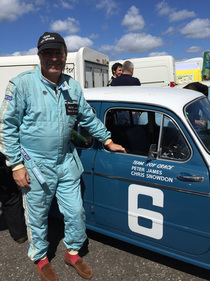 Also like me, you’re a foodie. What’s your favourite savoury food? Favourite sweet dish?
Also like me, you’re a foodie. What’s your favourite savoury food? Favourite sweet dish?
Savoury: oysters and anchovy olives.
Sweet: peanut M & Ms!
You love cars. Are there any racing or driving ambitions you’ve yet to achieve?
I love cars and in particular, historic motor racing, so my dream is to win the Saint Mary’s Trophy at the Goodwood Revival!
You can find and follow me on :
My website: www.peterjames.com
Facebook: http://www.facebook.com/peterjames.roygrace
Twitter: http://twitter.com/peterjamesuk
Instagram: https://instagram.com/peterjamesuk
My brand new YouTube channel: www.peterjames.com/YouTube
Thank you, Peter, for a great interview! It's been a pleasure talking to you.
Enjoyed this post? Please share via the links below:
Why not subscribe to my blog?
If you've enjoyed this post, how about subscribing to my blog via RSS feed or email? Either click the links in my blog sidebar or sign up via Networked Blogs, also in the sidebar. It'll be great to have you on board!
Get your free copy of The Second Captive!
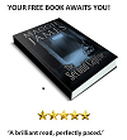 Sign up for my newsletter and you'll receive a free copy of The Second Captive in either Kindle, epub or PDF format! What will you get from my emails? Books from other novelists (with their permission, of course!), reading recommendations, discounts on my future releases, as well as promotions and giveaways. I'll contact you every two months or when I release a new title, and will never divulge your details to any third parties. To sign up, click this link. Thank you!
Sign up for my newsletter and you'll receive a free copy of The Second Captive in either Kindle, epub or PDF format! What will you get from my emails? Books from other novelists (with their permission, of course!), reading recommendations, discounts on my future releases, as well as promotions and giveaways. I'll contact you every two months or when I release a new title, and will never divulge your details to any third parties. To sign up, click this link. Thank you!
 I'm delighted to welcome novelist Peter James to my blog today! Peter is the author of the best-selling crime thrillers featuring Brighton-based Detective Superintendent Roy Grace, which have sold 18 million copies worldwide. Peter also writes supernatural fiction, such as The House on Cold Hill, a book I enjoyed very much. Welcome to my blog, Peter! With no further ado, let's proceed with the interview.
I'm delighted to welcome novelist Peter James to my blog today! Peter is the author of the best-selling crime thrillers featuring Brighton-based Detective Superintendent Roy Grace, which have sold 18 million copies worldwide. Peter also writes supernatural fiction, such as The House on Cold Hill, a book I enjoyed very much. Welcome to my blog, Peter! With no further ado, let's proceed with the interview.To what extent does DS Roy Grace reflect aspects of your own personality?
Roy Grace is based very loosely on former Chief Superintendent David Gaylor of Sussex CID. I was lucky enough to shadow David for many weeks over several years, during which he rose from Detective Inspector to Detective Superintendent. His office is Roy Grace’s office, and one of his areas of specialization was cold cases – also shared by Grace. But there the similarity ends – David is happily married and has no particular interest in the occult – although he is very open minded.
I like Roy Grace the most of any character I have created, and there is a lot of myself in him. I’m in some ways quite a loner, too. I have a fascination for the paranormal. I share his views when he attacks bigots, when he attacks horrible architecture, or when, in ‘Not Dead Enough’, he launches into a tirade at the terrible state of our hospital in Brighton, the Sussex County. Roy Grace is a man who believes that we all have an obligation, with our lives, to try to leave the world a slightly better place than when we first came into it. That’s my view and it is partly why I write, to examine and try to understand better the world we live in and why people do the things they go. But I do also love the terrible Norman Potting. He is able to say all kinds of politically incorrect things that can no longer be said!
Out of all your antagonists, who’s been the most fun for you to create, and why?
Jodie in ‘Love You Dead’, and Dr Crisp in ‘You Are Dead’. Jodie is inspired by a woman I met in a prison, who murdered her husband and mother-in-law, she is so evil she makes you smile at her audacity. Similarly, I like Doctor Edward Crisp’s combination of charm, quirkiness and utter evil – modelled on someone I know who is in a different profession.
 What’s been your most challenging novel when it comes to plotting, and why?
What’s been your most challenging novel when it comes to plotting, and why?
‘Dead Like You’ because it took place in two different time periods which was very complicated.
How does your writing day shape up? Lark or Owl? Plotter or Pantser?
My whole writing day is back to front… It is from the time when I was writing novels whilst working full time in film and television as a screen writer and producer, so I had to make my “Me time” to write. My writing day starts at 6pm in the evening, when I mix a large vodka martini, with four olives, put on some music, light up a cigar and get into a zone. I try to ensure that whatever I’m doing I leave myself time to write 1000 words 6 days a week. In terms of research – a lot I do before, but then as I progress I realise there is more I need to learn, and I’m an absolute stickler for research.
In the past, you’ve been very involved in film production. Do you see yourself returning to working in the film industry in the future?
I was a film producer for many years but I realized in 2005, shortly after making the film I'm most proud of, Merchant Of Venice with Al Pacino and Jeremy Irons, that actually, I much prefer writing novels. The problem with films is that they are such a collaborative process; it becomes almost like a committee, but up to 20 people who each believe it is their film! For example you have the screenwriter, and very often a second screen writer or “polisher”, the producer – sometimes two or even more. The executive producers, again sometimes two or more, the director, the principal actors, the director of photography, the set designer, the editor, the composer, the distributor and so on. Each and every one of these has influence on the end product. And most normally have egos the size of aircraft carriers. With a book the creative process is utterly pure. There is just myself and my agent and my editor. If I don’t want to change one single word I have written I don’t have to. I love that freedom from the “committee” process of film-making. I’d be very happy never to be involved in that industry again!
 Have you always been interested in the paranormal, or does your curiosity stem from your haunted house in Ditchling?
Have you always been interested in the paranormal, or does your curiosity stem from your haunted house in Ditchling?
Yes, I’ve always had an open on mind on the supernatural and I’ve met countless normal, rational people who have had something happen, at some point in their lives, for which they have no rational explanation.
The House On Cold Hill is very much inspired by – and modelled on – the isolated historic house in Sussex that my former wife and I bought in 1989 that you refer to, and I lived in for a decade – which turned out to be very seriously haunted. Whilst I have never actually seen a ghost, there were things that happened at that house I really couldn’t explain. I saw on many occasions, tiny pinpricks of white light floating in the air. A medium who I used a lot during my writing of Possession, visited my house and she told me I was slightly psychic, and that is why I saw these pinpricks, and that while I was not actually seeing the entire apparition, I was picking up on some of its energy.
Tell us about the work you do with the charity The Reading Agency.
I hugely support the Reading Agency, which tries to raise the standard of literacy in our nation. It’s a terribly sad statistic that the average reading age in a UK prison is currently equivalent to that of a nine-year-old child.
I give talks to help people with reading difficulties and I also give talks in prisons every year to try to encourage literacy among prisoners.
Like me, you’re passionately fond of animals. Tell us about your new venture into keeping alpacas!
My wife and I spent time with my publicist, Tony Mulliken, and his wife Pam at their home and they keep 6 alpacas. We saw what lovely creatures they are and we have a paddock at our Sussex home that was empty, so we decided to look into getting some of our own. We researched far and wide, and found an amazing local breeder, Spring Farm Alpacas, in Fletching, who care so well for their herd. They are hugely passionate about all the animals and know them all by name. Our 5 boys arrived in December last year and we just love them! They are very inquisitive creatures and full of character, they make us laugh every day!
 Also like me, you’re a foodie. What’s your favourite savoury food? Favourite sweet dish?
Also like me, you’re a foodie. What’s your favourite savoury food? Favourite sweet dish?
Savoury: oysters and anchovy olives.
Sweet: peanut M & Ms!
You love cars. Are there any racing or driving ambitions you’ve yet to achieve?
I love cars and in particular, historic motor racing, so my dream is to win the Saint Mary’s Trophy at the Goodwood Revival!
You can find and follow me on :
My website: www.peterjames.com
Facebook: http://www.facebook.com/peterjames.roygrace
Twitter: http://twitter.com/peterjamesuk
Instagram: https://instagram.com/peterjamesuk
My brand new YouTube channel: www.peterjames.com/YouTube
Thank you, Peter, for a great interview! It's been a pleasure talking to you.
Enjoyed this post? Please share via the links below:
Why not subscribe to my blog?
If you've enjoyed this post, how about subscribing to my blog via RSS feed or email? Either click the links in my blog sidebar or sign up via Networked Blogs, also in the sidebar. It'll be great to have you on board!
Get your free copy of The Second Captive!
 Sign up for my newsletter and you'll receive a free copy of The Second Captive in either Kindle, epub or PDF format! What will you get from my emails? Books from other novelists (with their permission, of course!), reading recommendations, discounts on my future releases, as well as promotions and giveaways. I'll contact you every two months or when I release a new title, and will never divulge your details to any third parties. To sign up, click this link. Thank you!
Sign up for my newsletter and you'll receive a free copy of The Second Captive in either Kindle, epub or PDF format! What will you get from my emails? Books from other novelists (with their permission, of course!), reading recommendations, discounts on my future releases, as well as promotions and giveaways. I'll contact you every two months or when I release a new title, and will never divulge your details to any third parties. To sign up, click this link. Thank you!
Published on October 11, 2016 06:40
October 4, 2016
Novel writing and the urge to travel
By Maggie JamesI have been passionate about foreign travel for as long as I can remember. During my twenties I did various solo trips within Europe, but yearned for more. My first big travel adventure started in 1989, when I embarked on a nine-month journey to Asia, Australia, New Zealand, the USA and Canada. Things were rough at first - nothing could have prepared me for India, my first stop. The noise, dirt, hustle and bustle almost proved overwhelming, especially when I was struck down by dysentery, a horror I hope never to experience again! Throughout the nine months, I grew more travel-hardy and overall had a fantastic trip. Over the ensuing decades I have carried on travelling, with my last big trip being a year-long visit to Asia and South America, which is when I wrote His Kidnapper's Shoes. Since my return I have become a full-time novelist, and in the future I'd like to combine the two great passions of my life by becoming a nomadic novelist. After all, I can write my books anywhere in the world via my laptop. I'm currently planning my next adventure!
As part of my 'Five' series, I though it would be fun to examine five other novelists who have been keen travellers, or whose trips have influenced their work. So, without further ado, let's pack our bags and journey to some amazing locations!
1. America's South-West - Vladimir Nabokov Vladimir Nabokov was a Russian-American novelist. His most famous novel, written in English, is Lolita (1955), notorious thanks to its controversial examination of an affair between a young girl and an older man. Nabokov had an avid interest in butterflies, which was what led to his exploration of the region, rather than a prurient interest in children (we hope!)
Vladimir Nabokov was a Russian-American novelist. His most famous novel, written in English, is Lolita (1955), notorious thanks to its controversial examination of an affair between a young girl and an older man. Nabokov had an avid interest in butterflies, which was what led to his exploration of the region, rather than a prurient interest in children (we hope!)
The area is stunningly beautiful and includes Arizona, parts of New Mexico, Colorado, Utah, Texas, Nevada and California. As someone who has long wanted to drive acoss the southern USA, I'd love to follow in Nabokov's footsteps, although without the butterfly net! Monument Valley will be a 'must see' on my itinerary when I do so. Perhaps it's time to write a road trip novel?
2. The French Riviera - Scott Fitzgerald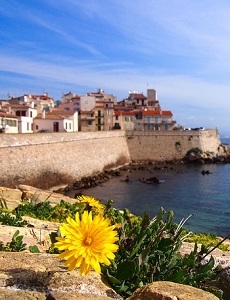 F. Scott Fitzgerald and his family once rented a seaside villa in Cap d'Antibes, where he wrote his most famous novel, The Great Gatsby. The French Riviera is located in the south-east of France on the Mediterranean, and became popular during the eighteenth century as a winter vacationing spot for the British upper class. It has also played host to other famous writers such as Aldous Huxley, Somerest Maugham and Edith Wharton.
F. Scott Fitzgerald and his family once rented a seaside villa in Cap d'Antibes, where he wrote his most famous novel, The Great Gatsby. The French Riviera is located in the south-east of France on the Mediterranean, and became popular during the eighteenth century as a winter vacationing spot for the British upper class. It has also played host to other famous writers such as Aldous Huxley, Somerest Maugham and Edith Wharton.
I've not visited the French Riviera for many years, but I well remember the fabulous wealth of Monaco and the beauty of the scenery. France isn't on my immediate list of countries to visit, but it would be good to return one day and explore further, following in the footsteps of the famous novelists I've mentioned.
3. The Florida Keys - Ernest Hemingway Ernest Hemingway is inextricably linked with the Florida Keys, in particular Key West, where he wrote To Have and Have Not. He also worked on the draft of A Farewell to Arms while living on the island.
Ernest Hemingway is inextricably linked with the Florida Keys, in particular Key West, where he wrote To Have and Have Not. He also worked on the draft of A Farewell to Arms while living on the island.
The drive from Miami through the Florida Keys is spectacular, and one I remember well, my destination being Key West with its relaxed atmosphere. When I was there in 1994 I visited Hemingway's house where he lived for eight years. As an avid animal lover, I was entranced by the cats there, all descendants of Hemingway's own felines and sporting six or seven toes rather than the usual five. The house itself contains much of interest and was one of the first on the island to benefit from modern plumbing and a swimming pool.
4. Henry Miller - Paris Henry Miller was an American author who developed a new form of writing novels, penning semi-autobiographical books involving social criticism, philosophy and explicit sexual references and language. His best know works include Tropic of Cancer, Tropic of Capricorn and Black Spring. He lived in Paris between 1930 and 1939, which is where he wrote Tropic of Cancer, telling a friend he'd write it as 'first person, uncensored, formless'. Whilst there he became friends with the British author Lawrence Durrell and began his affair with Anaïs Nin.
Henry Miller was an American author who developed a new form of writing novels, penning semi-autobiographical books involving social criticism, philosophy and explicit sexual references and language. His best know works include Tropic of Cancer, Tropic of Capricorn and Black Spring. He lived in Paris between 1930 and 1939, which is where he wrote Tropic of Cancer, telling a friend he'd write it as 'first person, uncensored, formless'. Whilst there he became friends with the British author Lawrence Durrell and began his affair with Anaïs Nin.
Paris is an easy trip for me, being a short hop on the Eurostar, and I was last there about eight years ago. The city has been home to many famous writers, including Honoré de Balzac, Victor Hugo, George Sand, Marcel Proust, Simone de Beauvoir, and Jean-Paul Sartre.
5. Cornwall, UK - Virginia Woolf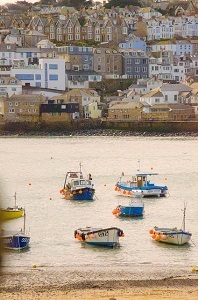 I've not visited Cornwall since my teens, but seeing the BBC's recent adaption of Poldark reminded me how beautiful that part of the UK is. I also read The Fire Child by S K Tremayne recently, which features the old Cornish tin mines along with photographs of them. The town's lovely coastal scenery, including Godrevy Lighthouse, may have been the inspiration behind Virginia Woolf's To the Lighthouse.
I've not visited Cornwall since my teens, but seeing the BBC's recent adaption of Poldark reminded me how beautiful that part of the UK is. I also read The Fire Child by S K Tremayne recently, which features the old Cornish tin mines along with photographs of them. The town's lovely coastal scenery, including Godrevy Lighthouse, may have been the inspiration behind Virginia Woolf's To the Lighthouse.
Other authors, including Poldark's Winston Graham, have used Cornwall’s landmarks in their books. Mary Wesley's The Camomile Lawn features Roseland House; the Headland was used in the film adaptation of Roald Dahl’s The Witches. Daphne Du Maurier's books also rely heavily on Cornwall as their backdrop. Perhaps it's time I paid the county another visit - who knows, I might get inspired for a future novel!
Get great books from one stop fiction!
 Before I go, I'd like to tell you about One Stop Fiction, a great new website for both readers and writers. It's free to join and readers can download lots of books, including my novella Blackwater Lake, for free. Why not give it a go? Either click the link above or the one in the sidebar.Enjoyed this post? Please share via the links below: Why not subscribe to my blog?If you've enjoyed this post, how about subscribing to my blog via RSS feed or email? Either click the links in my blog sidebar or sign up via Networked Blogs, also in the sidebar. It'll be great to have you on board! Get your free copy of The Second Captive!
Before I go, I'd like to tell you about One Stop Fiction, a great new website for both readers and writers. It's free to join and readers can download lots of books, including my novella Blackwater Lake, for free. Why not give it a go? Either click the link above or the one in the sidebar.Enjoyed this post? Please share via the links below: Why not subscribe to my blog?If you've enjoyed this post, how about subscribing to my blog via RSS feed or email? Either click the links in my blog sidebar or sign up via Networked Blogs, also in the sidebar. It'll be great to have you on board! Get your free copy of The Second Captive!
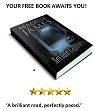 Sign up for my newsletter and you'll receive a free copy of The Second Captive in either Kindle, epub or PDF format! What will you get from my emails? Books from other novelists (with their permission, of course!), reading recommendations, discounts on my future releases, as well as promotions and giveaways. I'll contact you every two months or when I release a new title, and will never divulge your details to any third parties. To sign up, click this link. Thank you!
Sign up for my newsletter and you'll receive a free copy of The Second Captive in either Kindle, epub or PDF format! What will you get from my emails? Books from other novelists (with their permission, of course!), reading recommendations, discounts on my future releases, as well as promotions and giveaways. I'll contact you every two months or when I release a new title, and will never divulge your details to any third parties. To sign up, click this link. Thank you!
As part of my 'Five' series, I though it would be fun to examine five other novelists who have been keen travellers, or whose trips have influenced their work. So, without further ado, let's pack our bags and journey to some amazing locations!
1. America's South-West - Vladimir Nabokov
 Vladimir Nabokov was a Russian-American novelist. His most famous novel, written in English, is Lolita (1955), notorious thanks to its controversial examination of an affair between a young girl and an older man. Nabokov had an avid interest in butterflies, which was what led to his exploration of the region, rather than a prurient interest in children (we hope!)
Vladimir Nabokov was a Russian-American novelist. His most famous novel, written in English, is Lolita (1955), notorious thanks to its controversial examination of an affair between a young girl and an older man. Nabokov had an avid interest in butterflies, which was what led to his exploration of the region, rather than a prurient interest in children (we hope!)The area is stunningly beautiful and includes Arizona, parts of New Mexico, Colorado, Utah, Texas, Nevada and California. As someone who has long wanted to drive acoss the southern USA, I'd love to follow in Nabokov's footsteps, although without the butterfly net! Monument Valley will be a 'must see' on my itinerary when I do so. Perhaps it's time to write a road trip novel?
2. The French Riviera - Scott Fitzgerald
 F. Scott Fitzgerald and his family once rented a seaside villa in Cap d'Antibes, where he wrote his most famous novel, The Great Gatsby. The French Riviera is located in the south-east of France on the Mediterranean, and became popular during the eighteenth century as a winter vacationing spot for the British upper class. It has also played host to other famous writers such as Aldous Huxley, Somerest Maugham and Edith Wharton.
F. Scott Fitzgerald and his family once rented a seaside villa in Cap d'Antibes, where he wrote his most famous novel, The Great Gatsby. The French Riviera is located in the south-east of France on the Mediterranean, and became popular during the eighteenth century as a winter vacationing spot for the British upper class. It has also played host to other famous writers such as Aldous Huxley, Somerest Maugham and Edith Wharton.I've not visited the French Riviera for many years, but I well remember the fabulous wealth of Monaco and the beauty of the scenery. France isn't on my immediate list of countries to visit, but it would be good to return one day and explore further, following in the footsteps of the famous novelists I've mentioned.
3. The Florida Keys - Ernest Hemingway
 Ernest Hemingway is inextricably linked with the Florida Keys, in particular Key West, where he wrote To Have and Have Not. He also worked on the draft of A Farewell to Arms while living on the island.
Ernest Hemingway is inextricably linked with the Florida Keys, in particular Key West, where he wrote To Have and Have Not. He also worked on the draft of A Farewell to Arms while living on the island.The drive from Miami through the Florida Keys is spectacular, and one I remember well, my destination being Key West with its relaxed atmosphere. When I was there in 1994 I visited Hemingway's house where he lived for eight years. As an avid animal lover, I was entranced by the cats there, all descendants of Hemingway's own felines and sporting six or seven toes rather than the usual five. The house itself contains much of interest and was one of the first on the island to benefit from modern plumbing and a swimming pool.
4. Henry Miller - Paris
 Henry Miller was an American author who developed a new form of writing novels, penning semi-autobiographical books involving social criticism, philosophy and explicit sexual references and language. His best know works include Tropic of Cancer, Tropic of Capricorn and Black Spring. He lived in Paris between 1930 and 1939, which is where he wrote Tropic of Cancer, telling a friend he'd write it as 'first person, uncensored, formless'. Whilst there he became friends with the British author Lawrence Durrell and began his affair with Anaïs Nin.
Henry Miller was an American author who developed a new form of writing novels, penning semi-autobiographical books involving social criticism, philosophy and explicit sexual references and language. His best know works include Tropic of Cancer, Tropic of Capricorn and Black Spring. He lived in Paris between 1930 and 1939, which is where he wrote Tropic of Cancer, telling a friend he'd write it as 'first person, uncensored, formless'. Whilst there he became friends with the British author Lawrence Durrell and began his affair with Anaïs Nin.Paris is an easy trip for me, being a short hop on the Eurostar, and I was last there about eight years ago. The city has been home to many famous writers, including Honoré de Balzac, Victor Hugo, George Sand, Marcel Proust, Simone de Beauvoir, and Jean-Paul Sartre.
5. Cornwall, UK - Virginia Woolf
 I've not visited Cornwall since my teens, but seeing the BBC's recent adaption of Poldark reminded me how beautiful that part of the UK is. I also read The Fire Child by S K Tremayne recently, which features the old Cornish tin mines along with photographs of them. The town's lovely coastal scenery, including Godrevy Lighthouse, may have been the inspiration behind Virginia Woolf's To the Lighthouse.
I've not visited Cornwall since my teens, but seeing the BBC's recent adaption of Poldark reminded me how beautiful that part of the UK is. I also read The Fire Child by S K Tremayne recently, which features the old Cornish tin mines along with photographs of them. The town's lovely coastal scenery, including Godrevy Lighthouse, may have been the inspiration behind Virginia Woolf's To the Lighthouse.Other authors, including Poldark's Winston Graham, have used Cornwall’s landmarks in their books. Mary Wesley's The Camomile Lawn features Roseland House; the Headland was used in the film adaptation of Roald Dahl’s The Witches. Daphne Du Maurier's books also rely heavily on Cornwall as their backdrop. Perhaps it's time I paid the county another visit - who knows, I might get inspired for a future novel!
Get great books from one stop fiction!
 Before I go, I'd like to tell you about One Stop Fiction, a great new website for both readers and writers. It's free to join and readers can download lots of books, including my novella Blackwater Lake, for free. Why not give it a go? Either click the link above or the one in the sidebar.Enjoyed this post? Please share via the links below: Why not subscribe to my blog?If you've enjoyed this post, how about subscribing to my blog via RSS feed or email? Either click the links in my blog sidebar or sign up via Networked Blogs, also in the sidebar. It'll be great to have you on board! Get your free copy of The Second Captive!
Before I go, I'd like to tell you about One Stop Fiction, a great new website for both readers and writers. It's free to join and readers can download lots of books, including my novella Blackwater Lake, for free. Why not give it a go? Either click the link above or the one in the sidebar.Enjoyed this post? Please share via the links below: Why not subscribe to my blog?If you've enjoyed this post, how about subscribing to my blog via RSS feed or email? Either click the links in my blog sidebar or sign up via Networked Blogs, also in the sidebar. It'll be great to have you on board! Get your free copy of The Second Captive!
 Sign up for my newsletter and you'll receive a free copy of The Second Captive in either Kindle, epub or PDF format! What will you get from my emails? Books from other novelists (with their permission, of course!), reading recommendations, discounts on my future releases, as well as promotions and giveaways. I'll contact you every two months or when I release a new title, and will never divulge your details to any third parties. To sign up, click this link. Thank you!
Sign up for my newsletter and you'll receive a free copy of The Second Captive in either Kindle, epub or PDF format! What will you get from my emails? Books from other novelists (with their permission, of course!), reading recommendations, discounts on my future releases, as well as promotions and giveaways. I'll contact you every two months or when I release a new title, and will never divulge your details to any third parties. To sign up, click this link. Thank you!
Published on October 04, 2016 16:00
July 15, 2016
Welcome back, Iain Rob Wright!
By Maggie James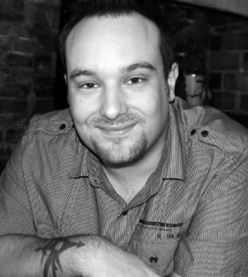 Iain Rob Wright was one of the first novelists I interviewed after I started this blog. (Click here to read my original post). Iain has now written over a dozen novels, including one with bestselling author, J.A.Konrath. Wow! I'm in awe of this man's prolific output. His career continues to go from strength to strength, and Iain has now branched out to provide a comprehensive course for self-published writers. I've invited him back to talk about the course, A- Z of Self-Publishing, and what else he has in store for his fans. A very warm welcome to you, sir!
Iain Rob Wright was one of the first novelists I interviewed after I started this blog. (Click here to read my original post). Iain has now written over a dozen novels, including one with bestselling author, J.A.Konrath. Wow! I'm in awe of this man's prolific output. His career continues to go from strength to strength, and Iain has now branched out to provide a comprehensive course for self-published writers. I've invited him back to talk about the course, A- Z of Self-Publishing, and what else he has in store for his fans. A very warm welcome to you, sir!
Firstly, please tell us why you have created your A-Z of Self-Publishing course.
Hi Maggie, thanks for having me.
I hope you’d agree, Maggie, that I have been helping writers for many years now. Ever since writers like J.A. Konrath helped me get started with my own career, I made it a philosophy to pay it forward and help those around me in the same way. For the last several years, I have made it a habit of sharing the things that have worked for me. The online course, A-Z of Self-Publishing, is the best way for me to do that on a large scale. It’s become too difficult to share everything in a weekly blog post, or mentor new authors individually, because I now have several thousand people following me on social media. It’s impossible to allocate enough time to help everyone, so I filled the course with everything I could think of that would help authors new and old, not just with selling more books, but creating them in the first place. I hate having to charge for it, but I made sure that the course is the best value for money authors will find anywhere.
What modules will the course cover?
The course currently has 9 units comprised of several lessons each (almost 50 in total). The lessons begin with writing your manuscript and take you right through the entire process of self-publishing (A-Z) from creating ebook, paperback, and audio files to building a website and mailing list. It finishes up by helping you sell your work using competitions, promotions, ad campaigns, and other ways to quickly grow your fan base. It gives detailed tutorials on all the tools and programs that a self-publisher might encounter, and gives insight and advice on how to get the basics absolutely spot on (like book descriptions and keywords).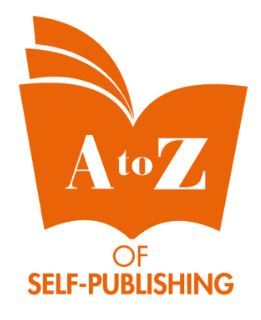 How is the course delivered? Is it mostly through videos, PDFs or some other medium?
How is the course delivered? Is it mostly through videos, PDFs or some other medium?
The course features about 30 hours of HD video and also includes supplementary material like pdfs and spreadsheets. This can all be accessed online on any device. I will add more content as I learn more. I still discover new methods and practices every day as I am in no way done with my own self-publishing career. The A-Z of Self-Publishing is almost a pledge to keep enrolled students up to speed on things as I get a handle on them myself. I am always looking at new ways to make money and gain readers, and I will put that knowledge into the course via future updates.
Are there discounts and supplementary material available?
All of the 3rd party tools mentioned are either free to use or feature exclusive discounts exclusively for students of the course. For example, you can get 30% off Scrivener. None of the paid tools are necessary to get through the course, but they are useful for those who want to invest in the very best software and programs.
How can your students get extra help if they need it?
There is a private Facebook group open only to students. They can talk to me directly in there, or speak with other students. I may also open a forum on the main website.
Will you cap the number of places available? Should interested students sign up sooner rather than later?
I won’t cap the number of places, but I will be opening enrolment only for a short 4-week period as I don’t want to overwhelm either the site or myself. This is the virgin launch so I don’t want to under-deliver on anything. I will place all of my focus on the first batch of students and then scale upwards in the future based on how things go.
Is there a money-back guarantee available and if so, how long for? Do you offer different payment options?
I offer a 30-day full refund with no questions asked. I’m not in this to take advantage of people so if they regret their decision I will undo it. Hopefully that won’t happen as I’m confident that the course offers superb value. There is also a payment plan to spread the cost over 12 months for those just starting out with their self-publishing careers. Like I said, I’m not looking to take advantage of people.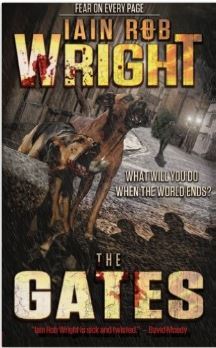 Tell us how you have built a highly successful career from self-publishing.
Tell us how you have built a highly successful career from self-publishing.
Luck was 90% of it, but the other 10% is probably down to the fact I never shut off. I am constantly paying attention to what is going on and what is working for other authors. I love writing, but that is the part of my job where I actually relax. Everything else is hard work, but vital to success. Last year, I wanted a new website, but rather than pay someone to build me one I learned how to do it all myself. Now I have a great website that grabs me about 100 new mailing list subscribers a day, but it took me months of learning and effort to get in place. Likewise, I learned how to create covers, format ebooks, create ads, and everything else because I like to be in control. I like to learn rather than delegate, and that’s the reason so many authors come to me for advice. It’s also the reason I am able to create a valuable course full of so many varied topics within self-publishing. No other course will teach you how to write a manuscript, create ebook files, build a website, run competitions and promotions, develop ad campaigns, and make money from affiliate products and Google. I teach it all from A-Z.
How do you see the future for self-publishing and hard-working indie authors?
It will be business. The smart and passionate will make money, the chancers might make money, and the lazy won’t make money. It’s becoming a normal and fair industry where success is down to the individual. That’s why it’s now so important to know what works and what doesn’t. It’s not about winning the lottery and having a publisher sell your book for you anymore. It’s about building and running a successful business – and how many businesses invest in training and education for their employees? Loads. Anyone who has worked in big business knows how often seminars and courses are available to staff. It’s vital to be at the forefront of what works. It’s vital to know your customer. And it’s vital to know how to target your ideal customers. Knowledge is power.
What can your fans expect next from the pen of Iain Rob Wright?
I will be writing the 3rd Sarah Stone book, then the 3rd Gates book, then a novella called Tar. Then… who knows?
Thank you, Iain! It's been a pleasure talking with you again.
You can get a taster of the full A-Z of Self-Publishing course for free by grabbing 3 TRAINING VIDEOS FOR AUTHORS. It’s a free mini course that people can sign up for on the homepage – www.azofselfpublishing.com.
You can find out more about Iain and get five of his novels for free from his website: www.iainrobwright.comLike this post? Please share via the links below: Why not subscribe to my blog?If you've enjoyed this post, how about subscribing to my blog via RSS feed or email? Either click the links in my blog sidebar or sign up via Networked Blogs, also in the sidebar. It'll be great to have you on board! Get your free copy of The Second Captive!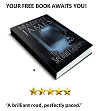 Sign up for my newsletter and you'll receive a free copy of The Second Captive in either Kindle, epub or PDF format! What will you get from my emails? Books from other novelists (with their permission, of course!), reading recommendations, discounts on my future releases, as well as promotions and giveaways. I'll contact you every two months or when I release a new title, and will never divulge your details to any third parties. To sign up, click this link. Thank you!
Sign up for my newsletter and you'll receive a free copy of The Second Captive in either Kindle, epub or PDF format! What will you get from my emails? Books from other novelists (with their permission, of course!), reading recommendations, discounts on my future releases, as well as promotions and giveaways. I'll contact you every two months or when I release a new title, and will never divulge your details to any third parties. To sign up, click this link. Thank you!
 Iain Rob Wright was one of the first novelists I interviewed after I started this blog. (Click here to read my original post). Iain has now written over a dozen novels, including one with bestselling author, J.A.Konrath. Wow! I'm in awe of this man's prolific output. His career continues to go from strength to strength, and Iain has now branched out to provide a comprehensive course for self-published writers. I've invited him back to talk about the course, A- Z of Self-Publishing, and what else he has in store for his fans. A very warm welcome to you, sir!
Iain Rob Wright was one of the first novelists I interviewed after I started this blog. (Click here to read my original post). Iain has now written over a dozen novels, including one with bestselling author, J.A.Konrath. Wow! I'm in awe of this man's prolific output. His career continues to go from strength to strength, and Iain has now branched out to provide a comprehensive course for self-published writers. I've invited him back to talk about the course, A- Z of Self-Publishing, and what else he has in store for his fans. A very warm welcome to you, sir!Firstly, please tell us why you have created your A-Z of Self-Publishing course.
Hi Maggie, thanks for having me.
I hope you’d agree, Maggie, that I have been helping writers for many years now. Ever since writers like J.A. Konrath helped me get started with my own career, I made it a philosophy to pay it forward and help those around me in the same way. For the last several years, I have made it a habit of sharing the things that have worked for me. The online course, A-Z of Self-Publishing, is the best way for me to do that on a large scale. It’s become too difficult to share everything in a weekly blog post, or mentor new authors individually, because I now have several thousand people following me on social media. It’s impossible to allocate enough time to help everyone, so I filled the course with everything I could think of that would help authors new and old, not just with selling more books, but creating them in the first place. I hate having to charge for it, but I made sure that the course is the best value for money authors will find anywhere.
What modules will the course cover?
The course currently has 9 units comprised of several lessons each (almost 50 in total). The lessons begin with writing your manuscript and take you right through the entire process of self-publishing (A-Z) from creating ebook, paperback, and audio files to building a website and mailing list. It finishes up by helping you sell your work using competitions, promotions, ad campaigns, and other ways to quickly grow your fan base. It gives detailed tutorials on all the tools and programs that a self-publisher might encounter, and gives insight and advice on how to get the basics absolutely spot on (like book descriptions and keywords).
 How is the course delivered? Is it mostly through videos, PDFs or some other medium?
How is the course delivered? Is it mostly through videos, PDFs or some other medium?The course features about 30 hours of HD video and also includes supplementary material like pdfs and spreadsheets. This can all be accessed online on any device. I will add more content as I learn more. I still discover new methods and practices every day as I am in no way done with my own self-publishing career. The A-Z of Self-Publishing is almost a pledge to keep enrolled students up to speed on things as I get a handle on them myself. I am always looking at new ways to make money and gain readers, and I will put that knowledge into the course via future updates.
Are there discounts and supplementary material available?
All of the 3rd party tools mentioned are either free to use or feature exclusive discounts exclusively for students of the course. For example, you can get 30% off Scrivener. None of the paid tools are necessary to get through the course, but they are useful for those who want to invest in the very best software and programs.
How can your students get extra help if they need it?
There is a private Facebook group open only to students. They can talk to me directly in there, or speak with other students. I may also open a forum on the main website.
Will you cap the number of places available? Should interested students sign up sooner rather than later?
I won’t cap the number of places, but I will be opening enrolment only for a short 4-week period as I don’t want to overwhelm either the site or myself. This is the virgin launch so I don’t want to under-deliver on anything. I will place all of my focus on the first batch of students and then scale upwards in the future based on how things go.
Is there a money-back guarantee available and if so, how long for? Do you offer different payment options?
I offer a 30-day full refund with no questions asked. I’m not in this to take advantage of people so if they regret their decision I will undo it. Hopefully that won’t happen as I’m confident that the course offers superb value. There is also a payment plan to spread the cost over 12 months for those just starting out with their self-publishing careers. Like I said, I’m not looking to take advantage of people.
 Tell us how you have built a highly successful career from self-publishing.
Tell us how you have built a highly successful career from self-publishing.Luck was 90% of it, but the other 10% is probably down to the fact I never shut off. I am constantly paying attention to what is going on and what is working for other authors. I love writing, but that is the part of my job where I actually relax. Everything else is hard work, but vital to success. Last year, I wanted a new website, but rather than pay someone to build me one I learned how to do it all myself. Now I have a great website that grabs me about 100 new mailing list subscribers a day, but it took me months of learning and effort to get in place. Likewise, I learned how to create covers, format ebooks, create ads, and everything else because I like to be in control. I like to learn rather than delegate, and that’s the reason so many authors come to me for advice. It’s also the reason I am able to create a valuable course full of so many varied topics within self-publishing. No other course will teach you how to write a manuscript, create ebook files, build a website, run competitions and promotions, develop ad campaigns, and make money from affiliate products and Google. I teach it all from A-Z.
How do you see the future for self-publishing and hard-working indie authors?
It will be business. The smart and passionate will make money, the chancers might make money, and the lazy won’t make money. It’s becoming a normal and fair industry where success is down to the individual. That’s why it’s now so important to know what works and what doesn’t. It’s not about winning the lottery and having a publisher sell your book for you anymore. It’s about building and running a successful business – and how many businesses invest in training and education for their employees? Loads. Anyone who has worked in big business knows how often seminars and courses are available to staff. It’s vital to be at the forefront of what works. It’s vital to know your customer. And it’s vital to know how to target your ideal customers. Knowledge is power.
What can your fans expect next from the pen of Iain Rob Wright?
I will be writing the 3rd Sarah Stone book, then the 3rd Gates book, then a novella called Tar. Then… who knows?
Thank you, Iain! It's been a pleasure talking with you again.
You can get a taster of the full A-Z of Self-Publishing course for free by grabbing 3 TRAINING VIDEOS FOR AUTHORS. It’s a free mini course that people can sign up for on the homepage – www.azofselfpublishing.com.
You can find out more about Iain and get five of his novels for free from his website: www.iainrobwright.comLike this post? Please share via the links below: Why not subscribe to my blog?If you've enjoyed this post, how about subscribing to my blog via RSS feed or email? Either click the links in my blog sidebar or sign up via Networked Blogs, also in the sidebar. It'll be great to have you on board! Get your free copy of The Second Captive!
 Sign up for my newsletter and you'll receive a free copy of The Second Captive in either Kindle, epub or PDF format! What will you get from my emails? Books from other novelists (with their permission, of course!), reading recommendations, discounts on my future releases, as well as promotions and giveaways. I'll contact you every two months or when I release a new title, and will never divulge your details to any third parties. To sign up, click this link. Thank you!
Sign up for my newsletter and you'll receive a free copy of The Second Captive in either Kindle, epub or PDF format! What will you get from my emails? Books from other novelists (with their permission, of course!), reading recommendations, discounts on my future releases, as well as promotions and giveaways. I'll contact you every two months or when I release a new title, and will never divulge your details to any third parties. To sign up, click this link. Thank you!
Published on July 15, 2016 00:03
July 8, 2016
Book review - The Widow, by Fiona Barton
By Maggie James
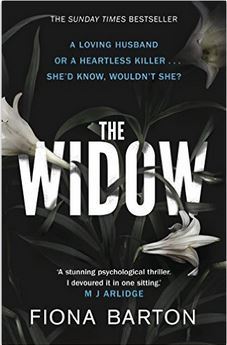 This week's blog post is a book review of The Widow, Fiona Barton's first and so far only novel. The book was published in 2016 and has achieved both Sunday Times and New York Times bestseller status. It's billed as 'the ultimate psychological thriller... a terrifically chilling exploration of the darkness at the heart of a seemingly ordinary marriage.' Wow! When I read that, I decided this novel was right up my street, both as the kind of book I like to read and also to write.. Here's the description from Amazon:
This week's blog post is a book review of The Widow, Fiona Barton's first and so far only novel. The book was published in 2016 and has achieved both Sunday Times and New York Times bestseller status. It's billed as 'the ultimate psychological thriller... a terrifically chilling exploration of the darkness at the heart of a seemingly ordinary marriage.' Wow! When I read that, I decided this novel was right up my street, both as the kind of book I like to read and also to write.. Here's the description from Amazon:
'We've all seen him: the man - the monster - staring from the front page of every newspaper, accused of a terrible crime.
But what about her: the woman who grips his arm on the courtroom stairs – the wife who stands by him?
Jean Taylor’s life was blissfully ordinary. Nice house, nice husband. Glen was all she’d ever wanted: her Prince Charming.
Until he became that man accused, that monster on the front page. Jean was married to a man everyone thought capable of unimaginable evil.
But now Glen is dead and she’s alone for the first time, free to tell her story on her own terms.
Jean Taylor is going to tell us what she knows.'
Sounds gripping, doesn't it? And The Widow doesn't disappoint. I read it in one sitting, forcing my eyes to stay open one night as I devoured the contents into the small hours. I loved Fiona's depiction of the two main characters, Glen and Jeanie Taylor. Glen is a petty, self-absorbed tyrant. His persona is wonderfully drawn, shown through the myriad ways he controls Jeanie and his failure to accept responsibility for his actions. Everything is someone else's fault, never his. (Don't we all know people like that?!) He attributes his dismissal from his bank job to his boss's jealousy rather than his unsatisfactory performance. When he's put on trial, he bills himself as a victim of police harassment. According to him, his obsession with child pornography is a medical condition for which he needs help. Not, of course, a sign of his warped nature, one that he keeps well-hidden. Here is a man who is outwardly unremarkable, yet, as the book asks, is he also a paedophile and a murderer? And is Jeanie complicit in his misdeeds?
The domineering Glen is mostly seen through the recollections of his down-trodden wife, who is a masterpiece of characterisation, expertly portrayed though subtle nuances. Jeanie adores her husband at first but her love fades as she realises the kind of man she has married. It's not long, though, before the reader starts to feel she may be hiding her own dark side. In addition, she might know more about Bella Elliott's disappearance than she's revealing. The only flaw, for me, was that she comes across as older than her age, which jars at times. This may be deliberate, to emphasise Jean's unworldliness, but if so, I think it's overdone. It's not just that her name would be more appropriate for an older woman. At times Jean behaves like a sterotypical pensioner, so much so that when the narrative refers to her as being thirty-seven, it comes as a shock. Well, to me, anyway.
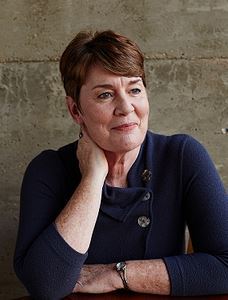 Fiona Barton, courtesy of her websiteAs a foil to Glen and Jeanie, the other central characters of journalist Kate Waters and DI Bob Sparkes are more crudely drawn. Sparkes is almost like a caricature of a detective inspector, and his scenes didn't come alive for me. Kate is a more convincing character, although hard to like. Ruthless in pursuit of a scoop for her newspaper, she's hard as nails despite the caring persona she projects. The descriptions of unsavoury press behaviour are hard to stomach, as they frequently descend into harassment and trial by media. Fiona Barton used to be a journalist, so the antics she depicts are presumably realistic, yet in my view they're abhorrent.
Fiona Barton, courtesy of her websiteAs a foil to Glen and Jeanie, the other central characters of journalist Kate Waters and DI Bob Sparkes are more crudely drawn. Sparkes is almost like a caricature of a detective inspector, and his scenes didn't come alive for me. Kate is a more convincing character, although hard to like. Ruthless in pursuit of a scoop for her newspaper, she's hard as nails despite the caring persona she projects. The descriptions of unsavoury press behaviour are hard to stomach, as they frequently descend into harassment and trial by media. Fiona Barton used to be a journalist, so the antics she depicts are presumably realistic, yet in my view they're abhorrent.
Those wanting thrills a minute and a high body count may be disappointed by this book. The story focuses more on Jeanie's character development rather than delivering a plot rollercoaster. There are no twists as such - the ending is fairly obvious from early on - and few startling revelations. That's not the strength of this novel. The interest lies more in the reader exploring every nook and cranny of Jeanie's mind, in understanding why she gradually turns against her husband during the course of her marriage. As a first novel, it's impressive, and I look forward to reading more from this author.
Fiona Barton is a former journalist who has worked for the Daily Mail, Daily Telegraph and The Mail on Sunday. In the latter role she won Reporter of the Year at the National Press Awards. She gave up her job to volunteer in Sri Lanka and has worked with exiled journalists all over the globe.
The idea for The Widow came from time spent during her journalistic career covering famous trials. Fiona began to wonder what the wives of the accused knew or allowed themselves to know about the crimes in question.
Fiona lives with her husband in rural France and is now working on her second novel. You can find out more at her website: http://fionabartonauthor.com/
Liked this post? Please share via the links below: Why not subscribe to my blog?
If you've enjoyed this post, how about subscribing to my blog via RSS feed or email? Either click the links in my blog sidebar or sign up via Networked Blogs, also in the sidebar. It'll be great to have you on board!
Get your free copy of The Second Captive!
 Sign up for my newsletter and you'll receive a free copy of The Second Captive in either Kindle, epub or PDF format! What will you get from my emails? Books from other novelists (with their permission, of course!), reading recommendations, discounts on my future releases, as well as promotions and giveaways. I'll contact you every two months or when I release a new title, and will never divulge your details to any third parties. To sign up, click this link. Thank you!
Sign up for my newsletter and you'll receive a free copy of The Second Captive in either Kindle, epub or PDF format! What will you get from my emails? Books from other novelists (with their permission, of course!), reading recommendations, discounts on my future releases, as well as promotions and giveaways. I'll contact you every two months or when I release a new title, and will never divulge your details to any third parties. To sign up, click this link. Thank you!
 This week's blog post is a book review of The Widow, Fiona Barton's first and so far only novel. The book was published in 2016 and has achieved both Sunday Times and New York Times bestseller status. It's billed as 'the ultimate psychological thriller... a terrifically chilling exploration of the darkness at the heart of a seemingly ordinary marriage.' Wow! When I read that, I decided this novel was right up my street, both as the kind of book I like to read and also to write.. Here's the description from Amazon:
This week's blog post is a book review of The Widow, Fiona Barton's first and so far only novel. The book was published in 2016 and has achieved both Sunday Times and New York Times bestseller status. It's billed as 'the ultimate psychological thriller... a terrifically chilling exploration of the darkness at the heart of a seemingly ordinary marriage.' Wow! When I read that, I decided this novel was right up my street, both as the kind of book I like to read and also to write.. Here's the description from Amazon:'We've all seen him: the man - the monster - staring from the front page of every newspaper, accused of a terrible crime.
But what about her: the woman who grips his arm on the courtroom stairs – the wife who stands by him?
Jean Taylor’s life was blissfully ordinary. Nice house, nice husband. Glen was all she’d ever wanted: her Prince Charming.
Until he became that man accused, that monster on the front page. Jean was married to a man everyone thought capable of unimaginable evil.
But now Glen is dead and she’s alone for the first time, free to tell her story on her own terms.
Jean Taylor is going to tell us what she knows.'
Sounds gripping, doesn't it? And The Widow doesn't disappoint. I read it in one sitting, forcing my eyes to stay open one night as I devoured the contents into the small hours. I loved Fiona's depiction of the two main characters, Glen and Jeanie Taylor. Glen is a petty, self-absorbed tyrant. His persona is wonderfully drawn, shown through the myriad ways he controls Jeanie and his failure to accept responsibility for his actions. Everything is someone else's fault, never his. (Don't we all know people like that?!) He attributes his dismissal from his bank job to his boss's jealousy rather than his unsatisfactory performance. When he's put on trial, he bills himself as a victim of police harassment. According to him, his obsession with child pornography is a medical condition for which he needs help. Not, of course, a sign of his warped nature, one that he keeps well-hidden. Here is a man who is outwardly unremarkable, yet, as the book asks, is he also a paedophile and a murderer? And is Jeanie complicit in his misdeeds?
The domineering Glen is mostly seen through the recollections of his down-trodden wife, who is a masterpiece of characterisation, expertly portrayed though subtle nuances. Jeanie adores her husband at first but her love fades as she realises the kind of man she has married. It's not long, though, before the reader starts to feel she may be hiding her own dark side. In addition, she might know more about Bella Elliott's disappearance than she's revealing. The only flaw, for me, was that she comes across as older than her age, which jars at times. This may be deliberate, to emphasise Jean's unworldliness, but if so, I think it's overdone. It's not just that her name would be more appropriate for an older woman. At times Jean behaves like a sterotypical pensioner, so much so that when the narrative refers to her as being thirty-seven, it comes as a shock. Well, to me, anyway.
 Fiona Barton, courtesy of her websiteAs a foil to Glen and Jeanie, the other central characters of journalist Kate Waters and DI Bob Sparkes are more crudely drawn. Sparkes is almost like a caricature of a detective inspector, and his scenes didn't come alive for me. Kate is a more convincing character, although hard to like. Ruthless in pursuit of a scoop for her newspaper, she's hard as nails despite the caring persona she projects. The descriptions of unsavoury press behaviour are hard to stomach, as they frequently descend into harassment and trial by media. Fiona Barton used to be a journalist, so the antics she depicts are presumably realistic, yet in my view they're abhorrent.
Fiona Barton, courtesy of her websiteAs a foil to Glen and Jeanie, the other central characters of journalist Kate Waters and DI Bob Sparkes are more crudely drawn. Sparkes is almost like a caricature of a detective inspector, and his scenes didn't come alive for me. Kate is a more convincing character, although hard to like. Ruthless in pursuit of a scoop for her newspaper, she's hard as nails despite the caring persona she projects. The descriptions of unsavoury press behaviour are hard to stomach, as they frequently descend into harassment and trial by media. Fiona Barton used to be a journalist, so the antics she depicts are presumably realistic, yet in my view they're abhorrent.Those wanting thrills a minute and a high body count may be disappointed by this book. The story focuses more on Jeanie's character development rather than delivering a plot rollercoaster. There are no twists as such - the ending is fairly obvious from early on - and few startling revelations. That's not the strength of this novel. The interest lies more in the reader exploring every nook and cranny of Jeanie's mind, in understanding why she gradually turns against her husband during the course of her marriage. As a first novel, it's impressive, and I look forward to reading more from this author.
Fiona Barton is a former journalist who has worked for the Daily Mail, Daily Telegraph and The Mail on Sunday. In the latter role she won Reporter of the Year at the National Press Awards. She gave up her job to volunteer in Sri Lanka and has worked with exiled journalists all over the globe.
The idea for The Widow came from time spent during her journalistic career covering famous trials. Fiona began to wonder what the wives of the accused knew or allowed themselves to know about the crimes in question.
Fiona lives with her husband in rural France and is now working on her second novel. You can find out more at her website: http://fionabartonauthor.com/
Liked this post? Please share via the links below: Why not subscribe to my blog?
If you've enjoyed this post, how about subscribing to my blog via RSS feed or email? Either click the links in my blog sidebar or sign up via Networked Blogs, also in the sidebar. It'll be great to have you on board!
Get your free copy of The Second Captive!
 Sign up for my newsletter and you'll receive a free copy of The Second Captive in either Kindle, epub or PDF format! What will you get from my emails? Books from other novelists (with their permission, of course!), reading recommendations, discounts on my future releases, as well as promotions and giveaways. I'll contact you every two months or when I release a new title, and will never divulge your details to any third parties. To sign up, click this link. Thank you!
Sign up for my newsletter and you'll receive a free copy of The Second Captive in either Kindle, epub or PDF format! What will you get from my emails? Books from other novelists (with their permission, of course!), reading recommendations, discounts on my future releases, as well as promotions and giveaways. I'll contact you every two months or when I release a new title, and will never divulge your details to any third parties. To sign up, click this link. Thank you!
Published on July 08, 2016 08:56
July 5, 2016
Maggots, spider bites and other fun research topics
By Maggie James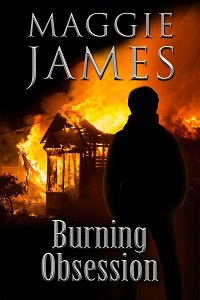 As a novelist, I often joke that my internet browsing history wouldn't stand up to police scrutiny. I frequently research unsavoury topics, along with some fascinating ones. The most interesting so far has been Stockholm syndrome, which I examined in The Second Captive. For many people, the notion that a hostage can develop a strong attachment to, or even love, their abusers/kidnappers is hard to comprehend. It certainly made for an absorbing research topic! I blogged about it here.
As a novelist, I often joke that my internet browsing history wouldn't stand up to police scrutiny. I frequently research unsavoury topics, along with some fascinating ones. The most interesting so far has been Stockholm syndrome, which I examined in The Second Captive. For many people, the notion that a hostage can develop a strong attachment to, or even love, their abusers/kidnappers is hard to comprehend. It certainly made for an absorbing research topic! I blogged about it here.
Not all things I've checked out have been such fun. For my next novel, Burning Obsession, I looked into compulsive firesetting, which brought me to the distinction between arson, pyromania and pyrophilia. Arson is the criminal act of deliberately setting light to property, often done for kicks or financial gain. Pyromania is different, as it involves an obsession with fire, resulting in anything being a target for burning, not just buildings. It was when I checked into pyrophilia that my research took a distinctly unsavoury turn. Pyrophiliacs are sexually aroused by fire, a fact I gleaned from a website devoted to unusual fetishes. I dislike sexual prudishness and don't care what capers consenting adults get up. However, some of the contributors to this website weren't concerned whether their sexual partner was consenting, an adult, or even human. The descriptions of torture turned my stomach. If I could scrub the mental images from my brain with bleach, I would, so enough on that topic.
Here come the maggots and spider bites...!
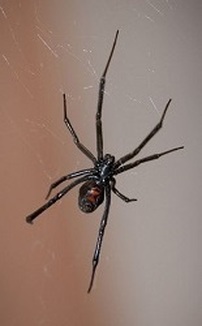 What else have I needed to research? Here's a rundown:
What else have I needed to research? Here's a rundown:
His Kidnapper's Shoes - genetics concerning eye colour/the onset of childhood memories;
Sister, Psychopath - head trauma/babies being suffocated by cats;
Guilty Innocence - anonymity orders;
Blackwater Lake - hoarding disorder/decomposition rates of bodies in cold and dark water.
Burning Obsession - ketamine abuse and the hallucinations known as the k-hole.
For fun, I posed the question in a Facebook group, asking fellow authors about the worst thing they've ever had to research. Some, like me, reported having to check out ghastly sexual exploits. Here are some of the responses:
'The effects of a dangerous spider bite.'
'I researched how the KGB used to trial poisons on prisoners.'
'The effects of decomposition in water . . . how difficult is it to lop a head off with a sword . . . how far can a knife penetrate a chest and NOT kill the 13-yr-old victim instantly . . . home-made bombs. The list goes on!!'
'Civil War amputations and battlefield treatments.'
'Human trafficking and buried bodies.'
'Medieval torture - those guys were nuts!!!'
'Live maggots... too gross to write about. Give me a body any day...'
'How blue bottles lay eggs in dead bodies, and how that helps date the death. Left it out in the end!'
'A scene where a character has a needle plunged into her heart to revive her.'
What about you?
Wow, that's a fun list! I don't doubt I'll have lots more unsavoury topics to delve into as I develop my writing career - it's just a question of what. Research isn't something I especially enjoy, but I'm keen to make my novels accurate. I still blush with embarrassment at the email I received that pointed out Scotch is a whisky, not a pine tree, and that my reference to Scotch pines in Blackwater Lake needed amending. Oops!
How about you? Have you ever read something ghastly in a novel and wondered, 'How the hell could the author investigate something so awful?' Authors, what about you? Have you ever researched anything stomach-churning? Would your internet browsing history stand up to inspection by the police?! Leave a comment and let me know!Like this post? Please share via the buttons below:
Why not subscribe to my blog?
If you've enjoyed this post, how about subscribing to my blog via RSS feed or email? Either click the links in my blog sidebar or sign up via Networked Blogs, also in the sidebar. It'll be great to have you on board!
Get your free copy of The Second Captive!
 Sign up for my newsletter and you'll receive a free copy of The Second Captive in either Kindle, epub or PDF format! What will you get from my emails? Books from other novelists (with their permission, of course!), reading recommendations, discounts on my future releases, as well as promotions and giveaways. I'll contact you every two months or when I release a new title, and will never divulge your details to any third parties. To sign up, click this link. Thank you!
Sign up for my newsletter and you'll receive a free copy of The Second Captive in either Kindle, epub or PDF format! What will you get from my emails? Books from other novelists (with their permission, of course!), reading recommendations, discounts on my future releases, as well as promotions and giveaways. I'll contact you every two months or when I release a new title, and will never divulge your details to any third parties. To sign up, click this link. Thank you!
 As a novelist, I often joke that my internet browsing history wouldn't stand up to police scrutiny. I frequently research unsavoury topics, along with some fascinating ones. The most interesting so far has been Stockholm syndrome, which I examined in The Second Captive. For many people, the notion that a hostage can develop a strong attachment to, or even love, their abusers/kidnappers is hard to comprehend. It certainly made for an absorbing research topic! I blogged about it here.
As a novelist, I often joke that my internet browsing history wouldn't stand up to police scrutiny. I frequently research unsavoury topics, along with some fascinating ones. The most interesting so far has been Stockholm syndrome, which I examined in The Second Captive. For many people, the notion that a hostage can develop a strong attachment to, or even love, their abusers/kidnappers is hard to comprehend. It certainly made for an absorbing research topic! I blogged about it here.Not all things I've checked out have been such fun. For my next novel, Burning Obsession, I looked into compulsive firesetting, which brought me to the distinction between arson, pyromania and pyrophilia. Arson is the criminal act of deliberately setting light to property, often done for kicks or financial gain. Pyromania is different, as it involves an obsession with fire, resulting in anything being a target for burning, not just buildings. It was when I checked into pyrophilia that my research took a distinctly unsavoury turn. Pyrophiliacs are sexually aroused by fire, a fact I gleaned from a website devoted to unusual fetishes. I dislike sexual prudishness and don't care what capers consenting adults get up. However, some of the contributors to this website weren't concerned whether their sexual partner was consenting, an adult, or even human. The descriptions of torture turned my stomach. If I could scrub the mental images from my brain with bleach, I would, so enough on that topic.
Here come the maggots and spider bites...!
 What else have I needed to research? Here's a rundown:
What else have I needed to research? Here's a rundown:His Kidnapper's Shoes - genetics concerning eye colour/the onset of childhood memories;
Sister, Psychopath - head trauma/babies being suffocated by cats;
Guilty Innocence - anonymity orders;
Blackwater Lake - hoarding disorder/decomposition rates of bodies in cold and dark water.
Burning Obsession - ketamine abuse and the hallucinations known as the k-hole.
For fun, I posed the question in a Facebook group, asking fellow authors about the worst thing they've ever had to research. Some, like me, reported having to check out ghastly sexual exploits. Here are some of the responses:
'The effects of a dangerous spider bite.'
'I researched how the KGB used to trial poisons on prisoners.'
'The effects of decomposition in water . . . how difficult is it to lop a head off with a sword . . . how far can a knife penetrate a chest and NOT kill the 13-yr-old victim instantly . . . home-made bombs. The list goes on!!'
'Civil War amputations and battlefield treatments.'
'Human trafficking and buried bodies.'
'Medieval torture - those guys were nuts!!!'
'Live maggots... too gross to write about. Give me a body any day...'
'How blue bottles lay eggs in dead bodies, and how that helps date the death. Left it out in the end!'
'A scene where a character has a needle plunged into her heart to revive her.'
What about you?
Wow, that's a fun list! I don't doubt I'll have lots more unsavoury topics to delve into as I develop my writing career - it's just a question of what. Research isn't something I especially enjoy, but I'm keen to make my novels accurate. I still blush with embarrassment at the email I received that pointed out Scotch is a whisky, not a pine tree, and that my reference to Scotch pines in Blackwater Lake needed amending. Oops!
How about you? Have you ever read something ghastly in a novel and wondered, 'How the hell could the author investigate something so awful?' Authors, what about you? Have you ever researched anything stomach-churning? Would your internet browsing history stand up to inspection by the police?! Leave a comment and let me know!Like this post? Please share via the buttons below:
Why not subscribe to my blog?
If you've enjoyed this post, how about subscribing to my blog via RSS feed or email? Either click the links in my blog sidebar or sign up via Networked Blogs, also in the sidebar. It'll be great to have you on board!
Get your free copy of The Second Captive!
 Sign up for my newsletter and you'll receive a free copy of The Second Captive in either Kindle, epub or PDF format! What will you get from my emails? Books from other novelists (with their permission, of course!), reading recommendations, discounts on my future releases, as well as promotions and giveaways. I'll contact you every two months or when I release a new title, and will never divulge your details to any third parties. To sign up, click this link. Thank you!
Sign up for my newsletter and you'll receive a free copy of The Second Captive in either Kindle, epub or PDF format! What will you get from my emails? Books from other novelists (with their permission, of course!), reading recommendations, discounts on my future releases, as well as promotions and giveaways. I'll contact you every two months or when I release a new title, and will never divulge your details to any third parties. To sign up, click this link. Thank you!
Published on July 05, 2016 08:04
June 23, 2016
Book review - End of Watch, by Stephen King
By Maggie James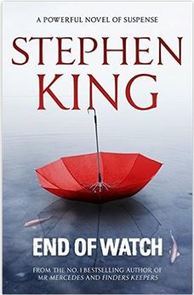 As readers of my blog will have gathered, I'm an avid Stephen King fan; I'm working my way through all his supernatural thrillers. Apart from Nightmares and Dreamscapes and the rather flat From a Buick 8 (read my review here), I've not yet read anything from King I haven't liked. So when I spotted the hardcover copy of End of Watch in the supermarket, I bought it straight away. The novel has only just been released, and is the final book in the Bill Hodges trilogy, the other two being Mr Mercedes and Finders Keepers. You can read my review of Mr Mercedes via this link; I didn't post a review for Finders Keepers, but I loved that one as well.
As readers of my blog will have gathered, I'm an avid Stephen King fan; I'm working my way through all his supernatural thrillers. Apart from Nightmares and Dreamscapes and the rather flat From a Buick 8 (read my review here), I've not yet read anything from King I haven't liked. So when I spotted the hardcover copy of End of Watch in the supermarket, I bought it straight away. The novel has only just been released, and is the final book in the Bill Hodges trilogy, the other two being Mr Mercedes and Finders Keepers. You can read my review of Mr Mercedes via this link; I didn't post a review for Finders Keepers, but I loved that one as well.
End of Watch, eh? The intriguing title, one that fits the story perfectly, comes from an American expression for police officers at the end of their working life. Those who retire permanently, or die. Which one will Bill Hodges do?
He's certainly an engaging sleuth, although a somewhat stereotypical one: retired police officer, divorced, battling health problems and with a past drinking problem. He's teamed with Holly Gibney, a woman with multiple issues of her own, along with Jerome Robinson, a student and former lawn boy for Bill. Books one and three of the trilogy concentrate heavily on the evil Brady Hartsfield, a mass murderer who's also obsessed with suicide. The middle novel, Finders Keepers, diverts to explore one of King's favourite topics, the writing life, although it involves the Brady Hartsfield character as well.
Here's the sales blurb for End of Watch:
'Retired Detective Bill Hodges now runs a two-person firm called Finders Keepers with his partner Holly Gibney. They met in the wake of the 'Mercedes Massacre' when a queue of people was run down by the diabolical killer Brady Hartsfield.
Brady is now confined to Room 217 of the Lakes Region Traumatic Brain Injury Clinic, in an unresponsive state. But all is not what it seems: the evidence suggests that Brady is somehow awake, and in possession of deadly new powers that allow him to wreak unimaginable havoc without ever leaving his hospital room.
When Bill and Holly are called to a suicide scene with ties to the Mercedes Massacre, they find themselves pulled into their most dangerous case yet, one that will put their lives at risk, as well as those of Bill's heroic young friend Jerome Robinson and his teenage sister, Barbara. Brady Hartsfield is back, and planning revenge not just on Hodges and his friends, but on an entire city.
The clock is ticking in unexpected ways...
Both a stand-alone novel of heart-pounding suspense and a sublimely terrifying final episode in the Hodges trilogy, End of Watch takes the series into a powerful new dimension.'
Absorbing characters, pink fish and a fast pace
 Photo by Amy Guip, 2006Sounds great, doesn't it? And End of Watch delivers the goods. Brady Hartsfield is a wonderfully warped villain, aided by his sidekicks Felix Babineau and Library Al, both of whom end up zombie-fied after Brady invades their minds. Intent on revenge on Bill Hodges, Brady will stop at nothing to achieve his goal, as well as drive thousands of young people to kill themselves. Although his brain was seriously damaged by Holly Gibney, Brady avails himself of new powers, possibly resulting from Felix Babineau using him in unauthorised drug trials. King also hints that the savage blow dealt by Holly may also have contributed, allowing Brady to access the 90% of his brain that lies dormant in all of us. As his extraordinary powers grow, the deaths begin...
Photo by Amy Guip, 2006Sounds great, doesn't it? And End of Watch delivers the goods. Brady Hartsfield is a wonderfully warped villain, aided by his sidekicks Felix Babineau and Library Al, both of whom end up zombie-fied after Brady invades their minds. Intent on revenge on Bill Hodges, Brady will stop at nothing to achieve his goal, as well as drive thousands of young people to kill themselves. Although his brain was seriously damaged by Holly Gibney, Brady avails himself of new powers, possibly resulting from Felix Babineau using him in unauthorised drug trials. King also hints that the savage blow dealt by Holly may also have contributed, allowing Brady to access the 90% of his brain that lies dormant in all of us. As his extraordinary powers grow, the deaths begin...
Stephen King is a master at creating memorable characters (think Jack Torrance, Annie Wilkes, Jake Epping). End of Watch also has an interesting cast list, one that develops both Bill Hodges and Holly Gibney, more so the latter. Whilst it's not specifically mentioned, Holly is either autistic or has Asperger's syndrome, and the book shows her shedding her coping mechanisms as the story progresses. It's Brady Hartsfield, though, who receives the full Stephen King treatment, morphing from a catatonic invalid to a mind in motion, capable of transferring into other bodies at will. His evil mission poses a huge problem for Bill and Holly in their race to stop him. They can hardly tell the police what they suspect Brady is up to, after all!
I found some aspects of the plot a little far-fetched - the use of obsolete games consoles to facilitate mind control, for example, and the numerical pink fish. Perhaps that's a little unfair, as Brady's opportunities for evil are limited initially, and the use of technology, albeit outdated, fits what we already know of him as a computer expert. Besides, this is Stephen King, creator of Pennywise the Dancing Clown, supernatural cars and telekinetic teenagers. Beside them, digital pink fish seem small fry!
King can be verbose at times, but his mastery of words coupled with his talent transcends what might grate if coming from a lesser writer. End of Watch rollicks along at a fast pace towards the satisfying, if sad, conclusion. It can be read either as the third book in the Mr Mercedes trilogy, or would work equally well as a standalone novel. If you're a fan of his novels, I suspect you'll love this book.
What about you?
Have you read End of Watch, or any of the other two books in the trilogy? What did you think? Leave a comment and let me know!
Liked this post? Please share via the links below:
Why not subscribe to my blog?
If you've enjoyed this post, how about subscribing to my blog via RSS feed or email? Either click the links in my blog sidebar or sign up via Networked Blogs, also in the sidebar. It'll be great to have you on board!
Get your free copy of The Second Captive! Sign up for my newsletter and you'll receive a free copy of The Second Captive in either Kindle, epub or PDF format! What will you get from my emails? Books from other novelists (with their permission, of course!), reading recommendations, discounts on my future releases, as well as promotions and giveaways. I'll contact you every two months or when I release a new title, and will never divulge your details to any third parties. To sign up, click this link. Thank you!
Sign up for my newsletter and you'll receive a free copy of The Second Captive in either Kindle, epub or PDF format! What will you get from my emails? Books from other novelists (with their permission, of course!), reading recommendations, discounts on my future releases, as well as promotions and giveaways. I'll contact you every two months or when I release a new title, and will never divulge your details to any third parties. To sign up, click this link. Thank you!
 As readers of my blog will have gathered, I'm an avid Stephen King fan; I'm working my way through all his supernatural thrillers. Apart from Nightmares and Dreamscapes and the rather flat From a Buick 8 (read my review here), I've not yet read anything from King I haven't liked. So when I spotted the hardcover copy of End of Watch in the supermarket, I bought it straight away. The novel has only just been released, and is the final book in the Bill Hodges trilogy, the other two being Mr Mercedes and Finders Keepers. You can read my review of Mr Mercedes via this link; I didn't post a review for Finders Keepers, but I loved that one as well.
As readers of my blog will have gathered, I'm an avid Stephen King fan; I'm working my way through all his supernatural thrillers. Apart from Nightmares and Dreamscapes and the rather flat From a Buick 8 (read my review here), I've not yet read anything from King I haven't liked. So when I spotted the hardcover copy of End of Watch in the supermarket, I bought it straight away. The novel has only just been released, and is the final book in the Bill Hodges trilogy, the other two being Mr Mercedes and Finders Keepers. You can read my review of Mr Mercedes via this link; I didn't post a review for Finders Keepers, but I loved that one as well.End of Watch, eh? The intriguing title, one that fits the story perfectly, comes from an American expression for police officers at the end of their working life. Those who retire permanently, or die. Which one will Bill Hodges do?
He's certainly an engaging sleuth, although a somewhat stereotypical one: retired police officer, divorced, battling health problems and with a past drinking problem. He's teamed with Holly Gibney, a woman with multiple issues of her own, along with Jerome Robinson, a student and former lawn boy for Bill. Books one and three of the trilogy concentrate heavily on the evil Brady Hartsfield, a mass murderer who's also obsessed with suicide. The middle novel, Finders Keepers, diverts to explore one of King's favourite topics, the writing life, although it involves the Brady Hartsfield character as well.
Here's the sales blurb for End of Watch:
'Retired Detective Bill Hodges now runs a two-person firm called Finders Keepers with his partner Holly Gibney. They met in the wake of the 'Mercedes Massacre' when a queue of people was run down by the diabolical killer Brady Hartsfield.
Brady is now confined to Room 217 of the Lakes Region Traumatic Brain Injury Clinic, in an unresponsive state. But all is not what it seems: the evidence suggests that Brady is somehow awake, and in possession of deadly new powers that allow him to wreak unimaginable havoc without ever leaving his hospital room.
When Bill and Holly are called to a suicide scene with ties to the Mercedes Massacre, they find themselves pulled into their most dangerous case yet, one that will put their lives at risk, as well as those of Bill's heroic young friend Jerome Robinson and his teenage sister, Barbara. Brady Hartsfield is back, and planning revenge not just on Hodges and his friends, but on an entire city.
The clock is ticking in unexpected ways...
Both a stand-alone novel of heart-pounding suspense and a sublimely terrifying final episode in the Hodges trilogy, End of Watch takes the series into a powerful new dimension.'
Absorbing characters, pink fish and a fast pace
 Photo by Amy Guip, 2006Sounds great, doesn't it? And End of Watch delivers the goods. Brady Hartsfield is a wonderfully warped villain, aided by his sidekicks Felix Babineau and Library Al, both of whom end up zombie-fied after Brady invades their minds. Intent on revenge on Bill Hodges, Brady will stop at nothing to achieve his goal, as well as drive thousands of young people to kill themselves. Although his brain was seriously damaged by Holly Gibney, Brady avails himself of new powers, possibly resulting from Felix Babineau using him in unauthorised drug trials. King also hints that the savage blow dealt by Holly may also have contributed, allowing Brady to access the 90% of his brain that lies dormant in all of us. As his extraordinary powers grow, the deaths begin...
Photo by Amy Guip, 2006Sounds great, doesn't it? And End of Watch delivers the goods. Brady Hartsfield is a wonderfully warped villain, aided by his sidekicks Felix Babineau and Library Al, both of whom end up zombie-fied after Brady invades their minds. Intent on revenge on Bill Hodges, Brady will stop at nothing to achieve his goal, as well as drive thousands of young people to kill themselves. Although his brain was seriously damaged by Holly Gibney, Brady avails himself of new powers, possibly resulting from Felix Babineau using him in unauthorised drug trials. King also hints that the savage blow dealt by Holly may also have contributed, allowing Brady to access the 90% of his brain that lies dormant in all of us. As his extraordinary powers grow, the deaths begin...Stephen King is a master at creating memorable characters (think Jack Torrance, Annie Wilkes, Jake Epping). End of Watch also has an interesting cast list, one that develops both Bill Hodges and Holly Gibney, more so the latter. Whilst it's not specifically mentioned, Holly is either autistic or has Asperger's syndrome, and the book shows her shedding her coping mechanisms as the story progresses. It's Brady Hartsfield, though, who receives the full Stephen King treatment, morphing from a catatonic invalid to a mind in motion, capable of transferring into other bodies at will. His evil mission poses a huge problem for Bill and Holly in their race to stop him. They can hardly tell the police what they suspect Brady is up to, after all!
I found some aspects of the plot a little far-fetched - the use of obsolete games consoles to facilitate mind control, for example, and the numerical pink fish. Perhaps that's a little unfair, as Brady's opportunities for evil are limited initially, and the use of technology, albeit outdated, fits what we already know of him as a computer expert. Besides, this is Stephen King, creator of Pennywise the Dancing Clown, supernatural cars and telekinetic teenagers. Beside them, digital pink fish seem small fry!
King can be verbose at times, but his mastery of words coupled with his talent transcends what might grate if coming from a lesser writer. End of Watch rollicks along at a fast pace towards the satisfying, if sad, conclusion. It can be read either as the third book in the Mr Mercedes trilogy, or would work equally well as a standalone novel. If you're a fan of his novels, I suspect you'll love this book.
What about you?
Have you read End of Watch, or any of the other two books in the trilogy? What did you think? Leave a comment and let me know!
Liked this post? Please share via the links below:
Why not subscribe to my blog?
If you've enjoyed this post, how about subscribing to my blog via RSS feed or email? Either click the links in my blog sidebar or sign up via Networked Blogs, also in the sidebar. It'll be great to have you on board!
Get your free copy of The Second Captive!
 Sign up for my newsletter and you'll receive a free copy of The Second Captive in either Kindle, epub or PDF format! What will you get from my emails? Books from other novelists (with their permission, of course!), reading recommendations, discounts on my future releases, as well as promotions and giveaways. I'll contact you every two months or when I release a new title, and will never divulge your details to any third parties. To sign up, click this link. Thank you!
Sign up for my newsletter and you'll receive a free copy of The Second Captive in either Kindle, epub or PDF format! What will you get from my emails? Books from other novelists (with their permission, of course!), reading recommendations, discounts on my future releases, as well as promotions and giveaways. I'll contact you every two months or when I release a new title, and will never divulge your details to any third parties. To sign up, click this link. Thank you!
Published on June 23, 2016 07:10



